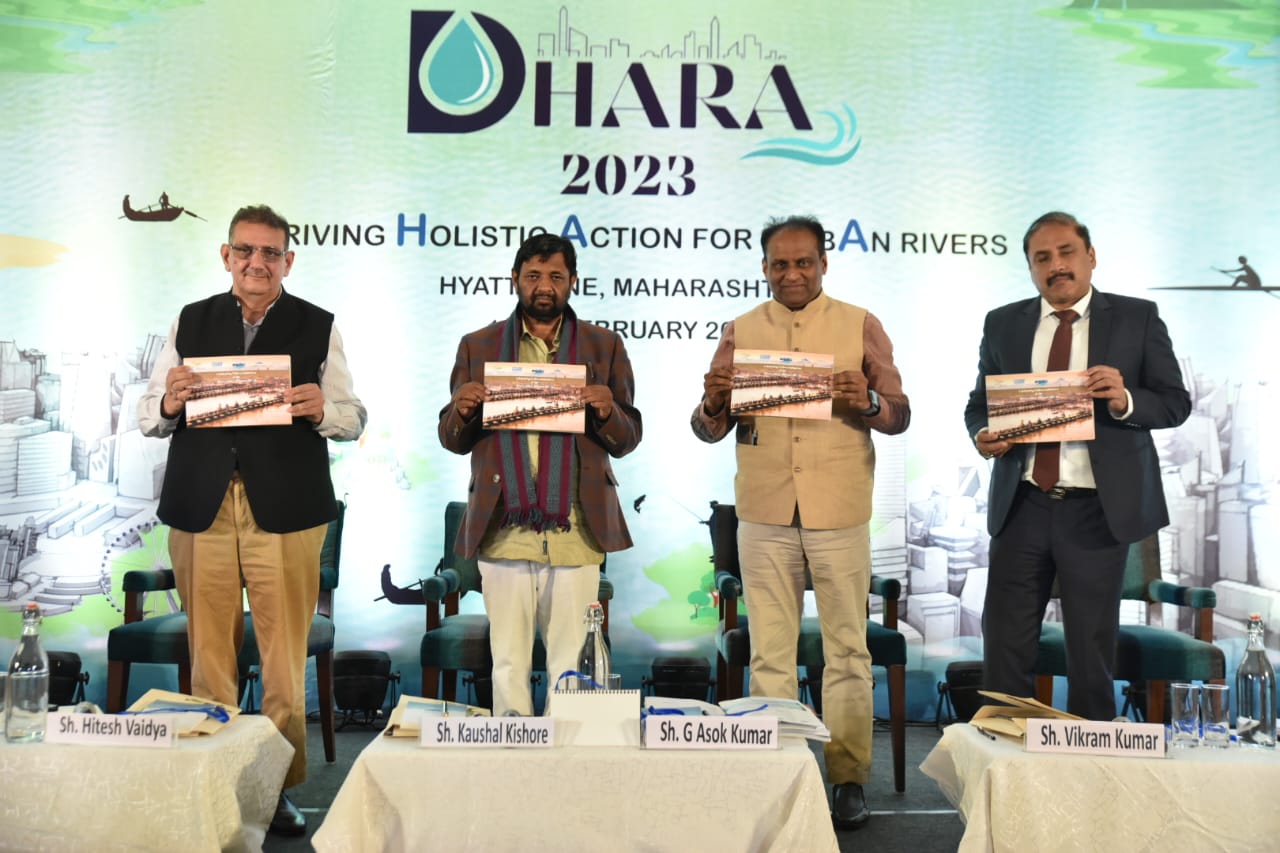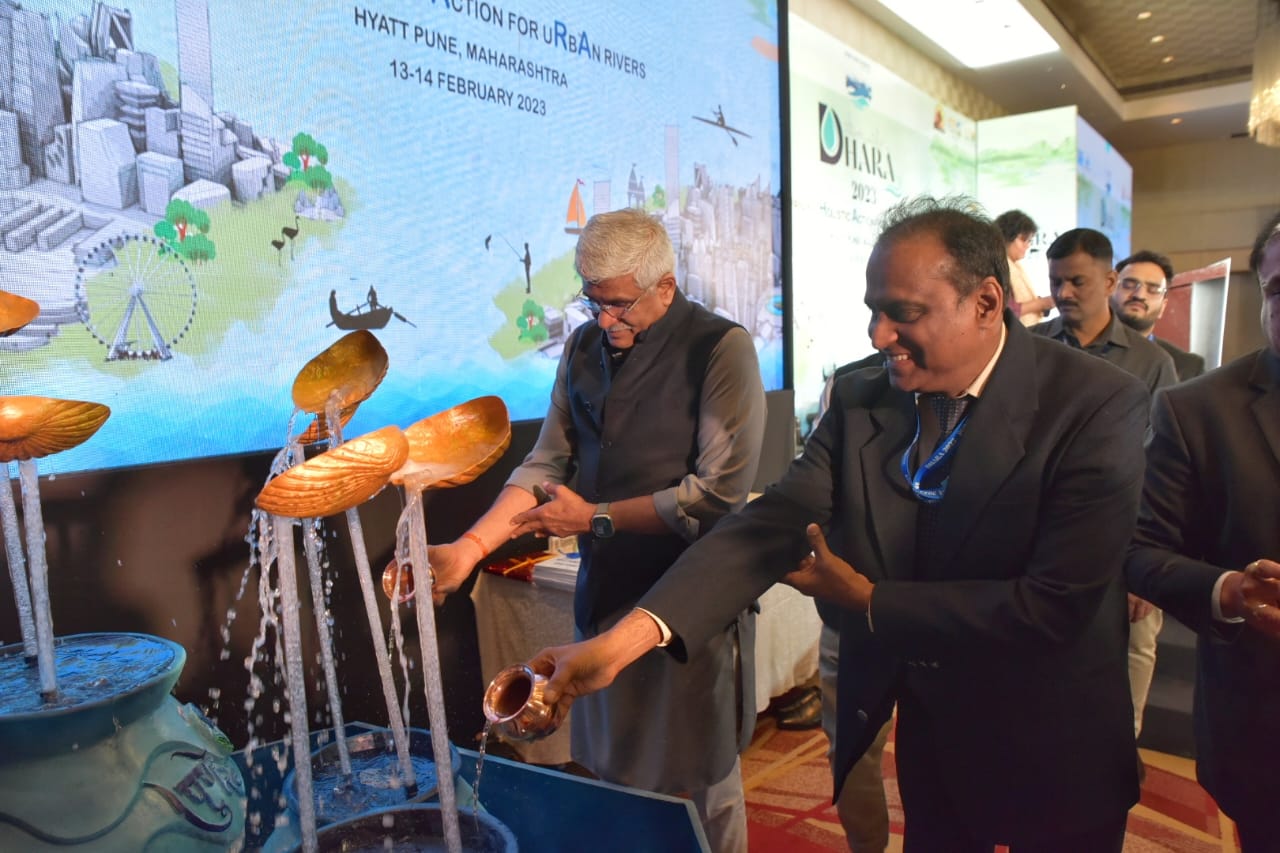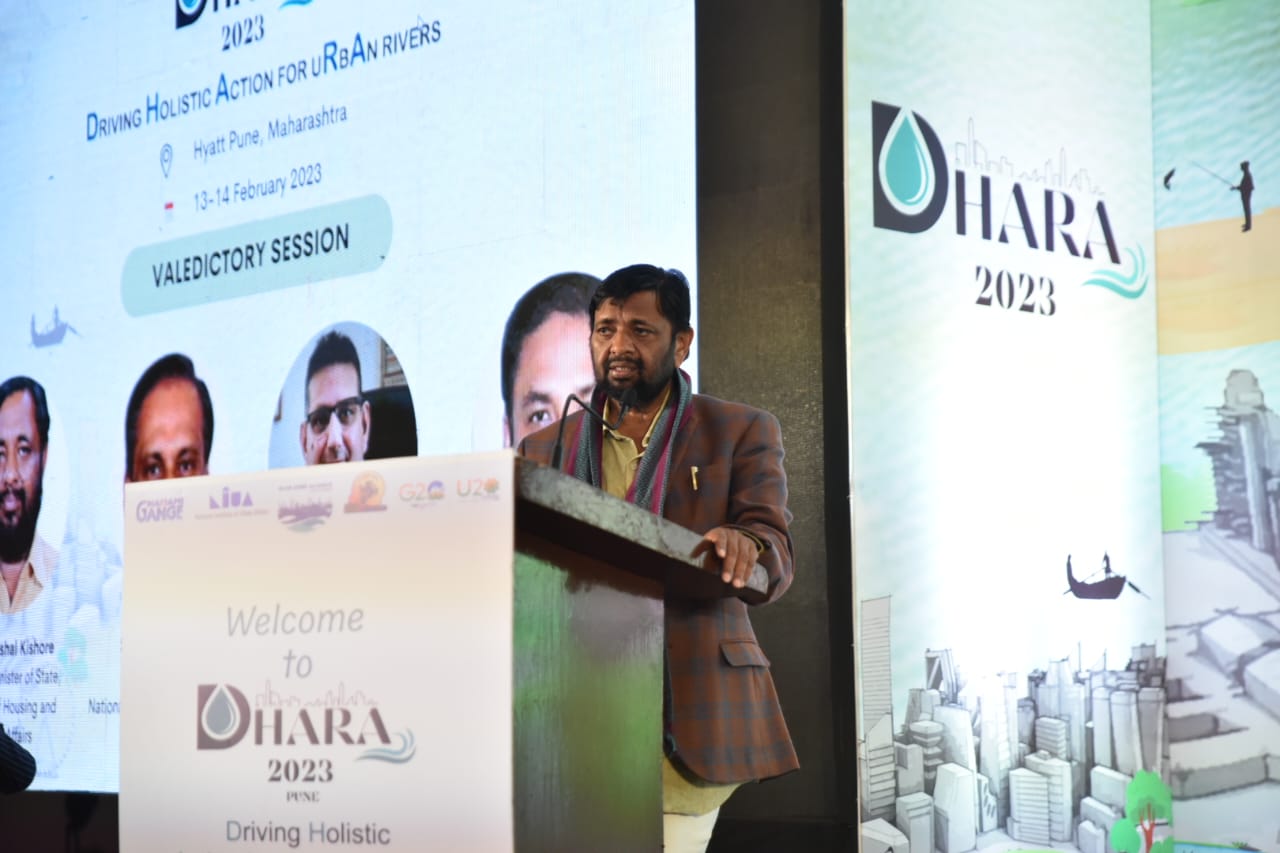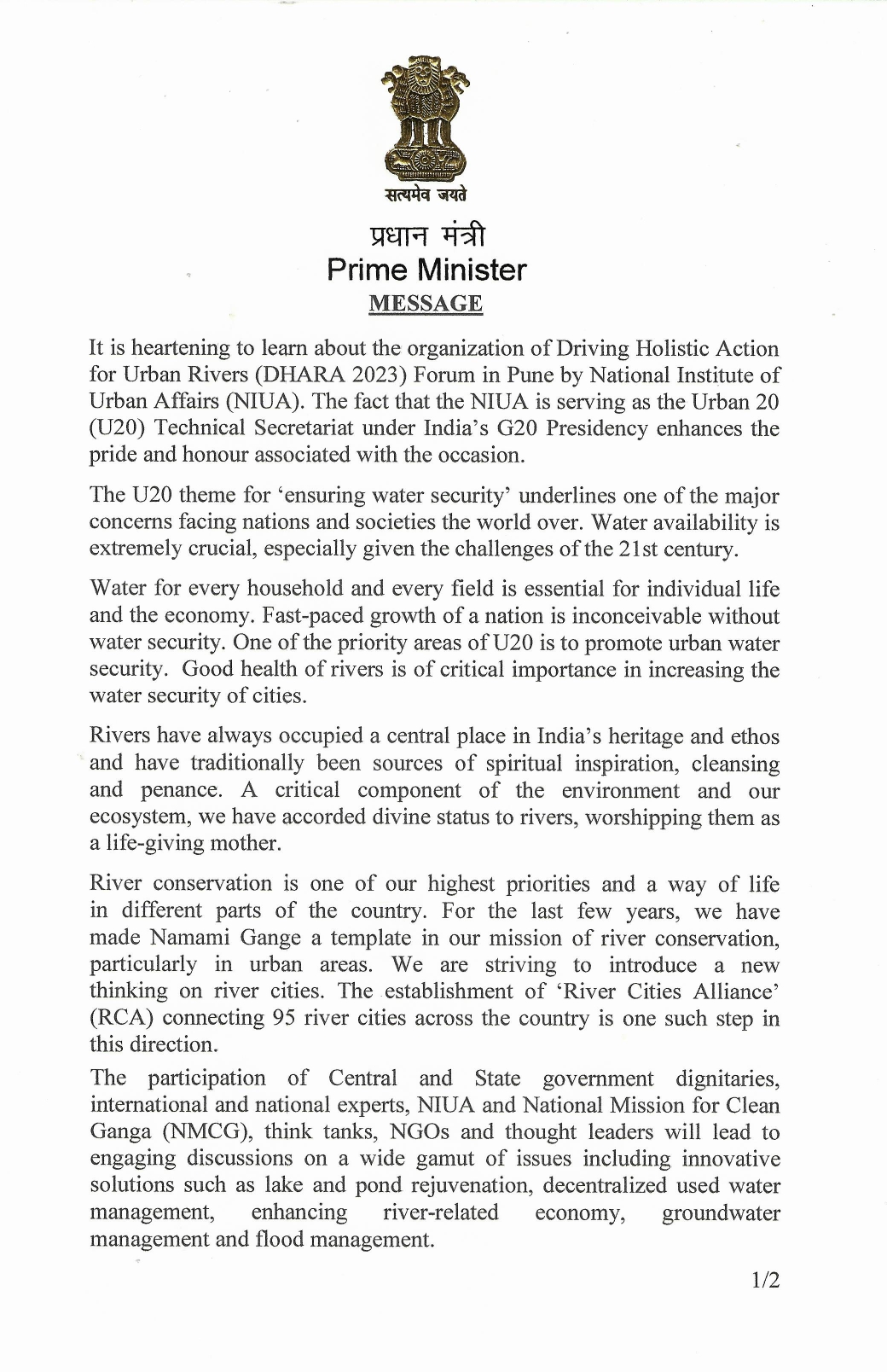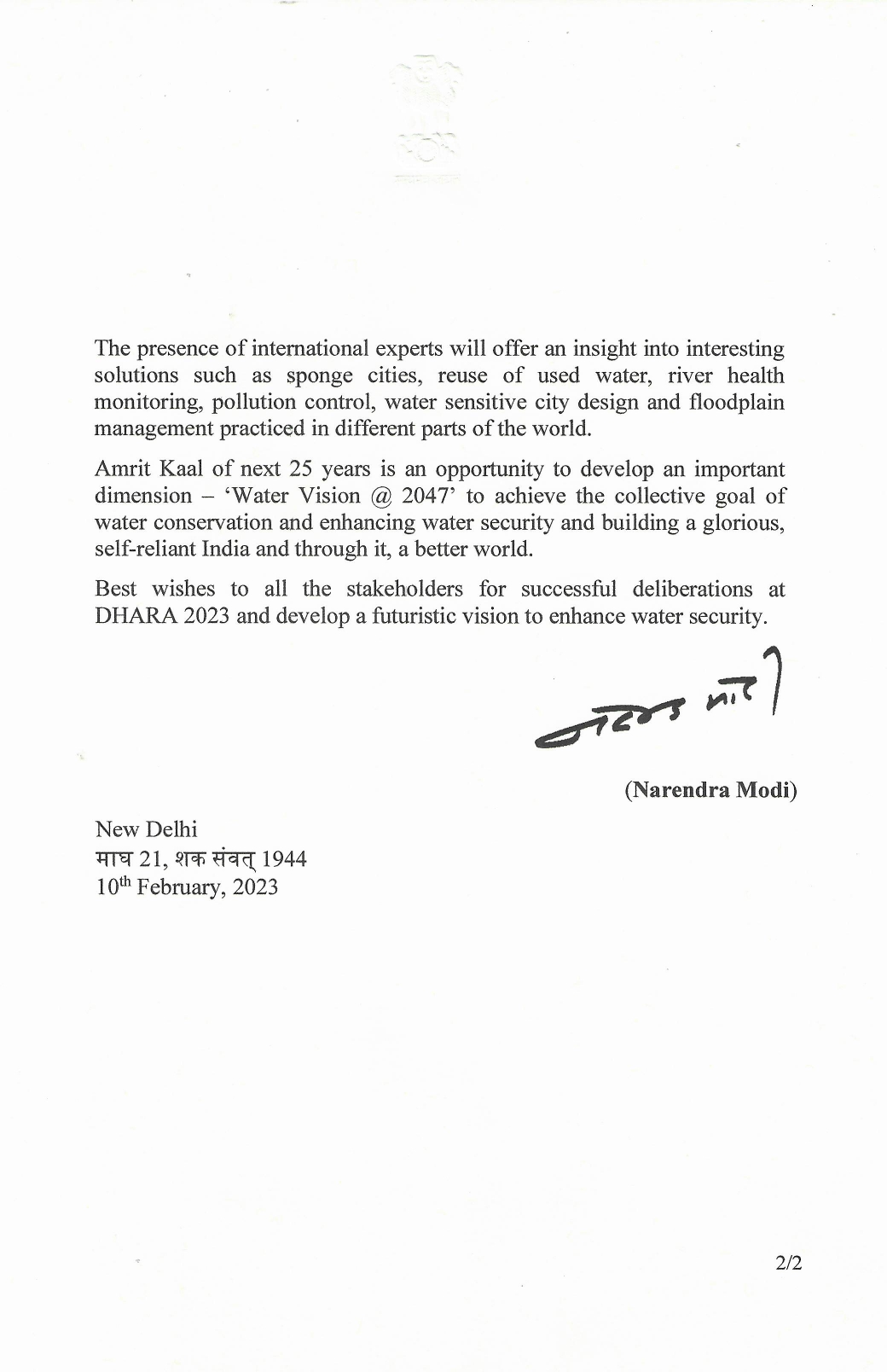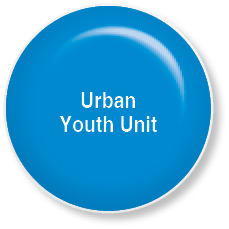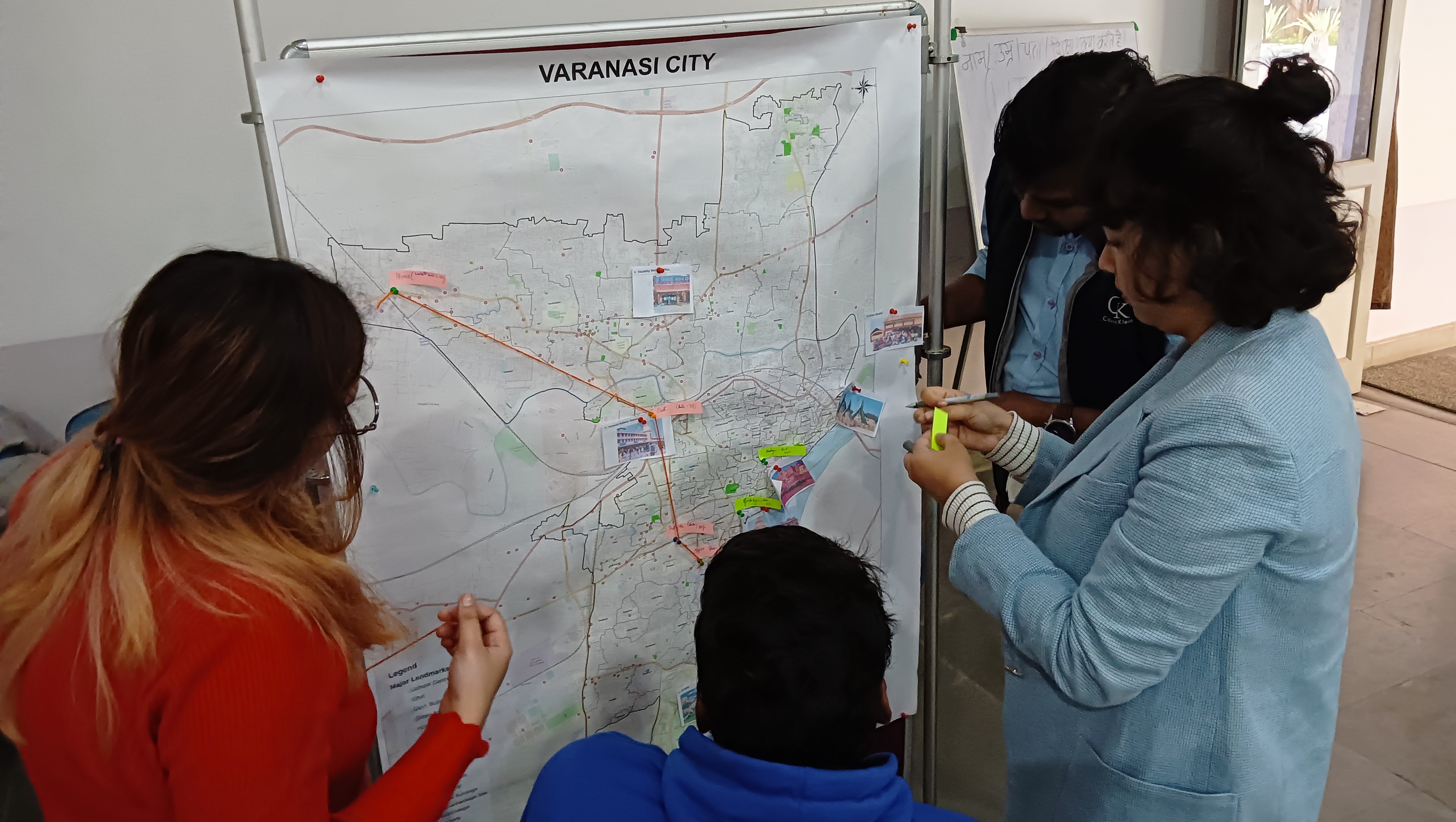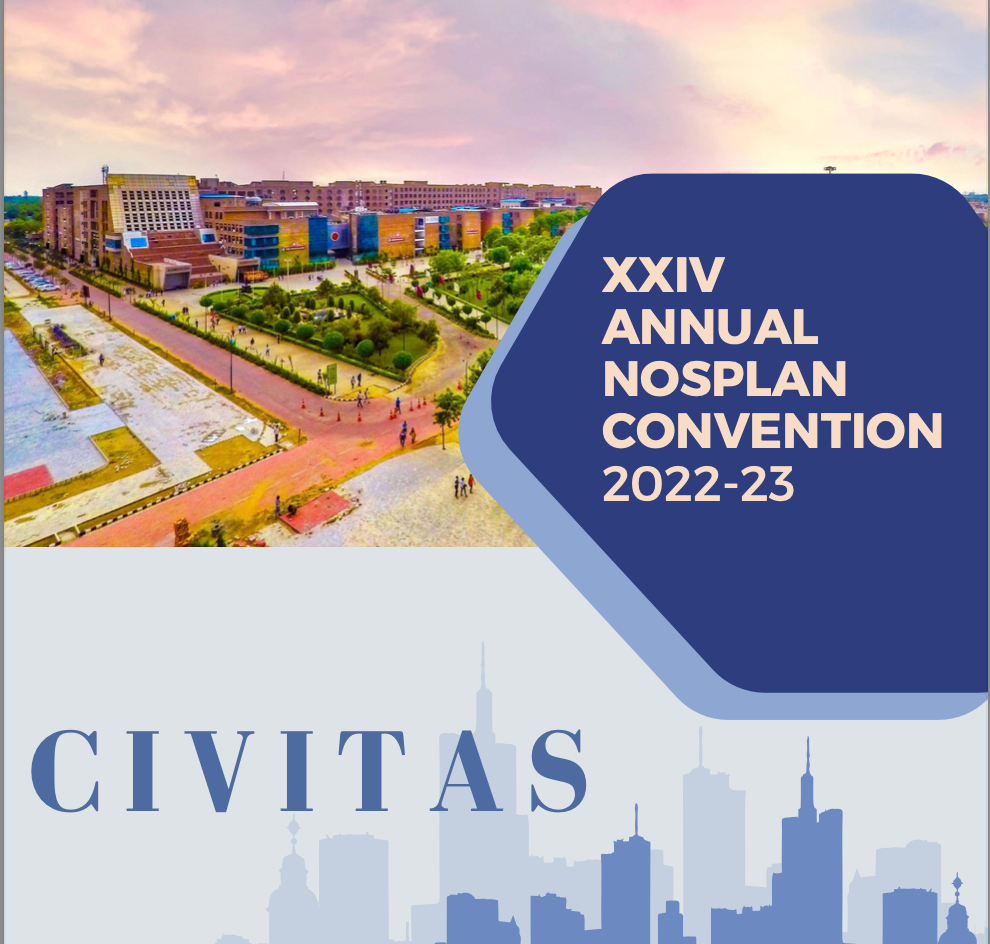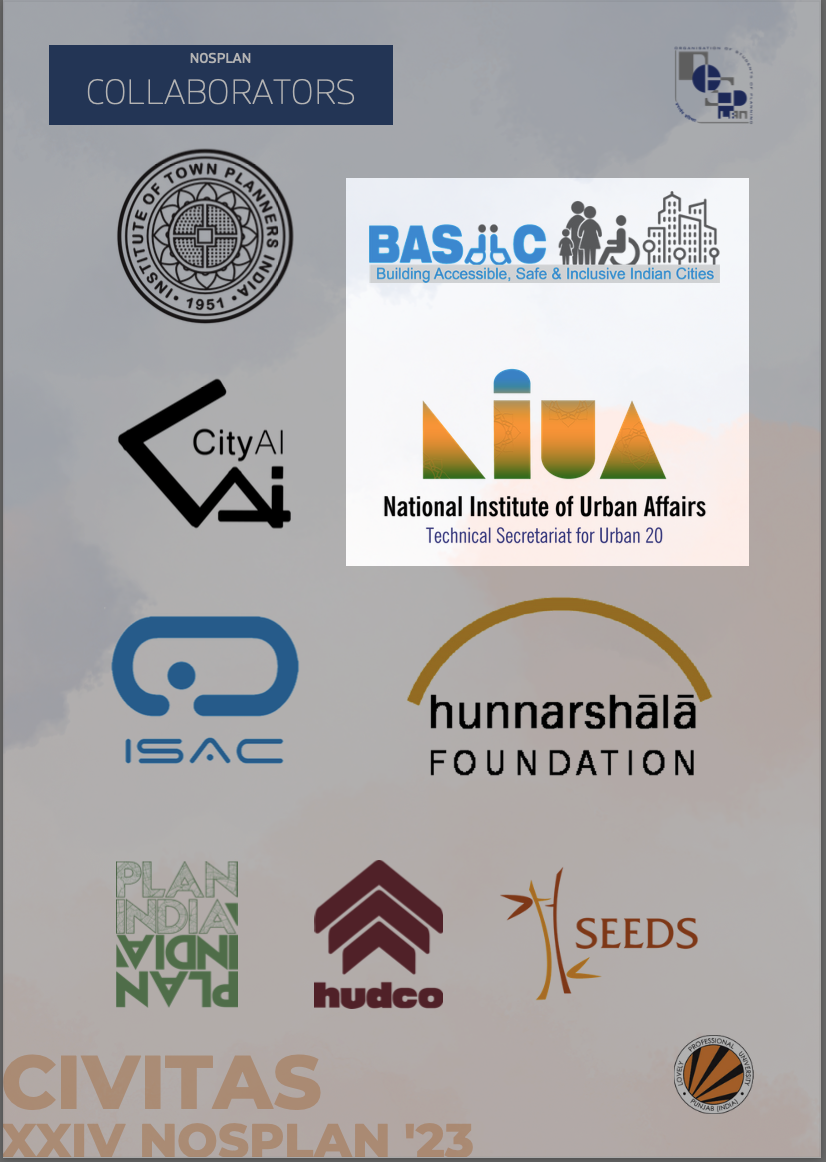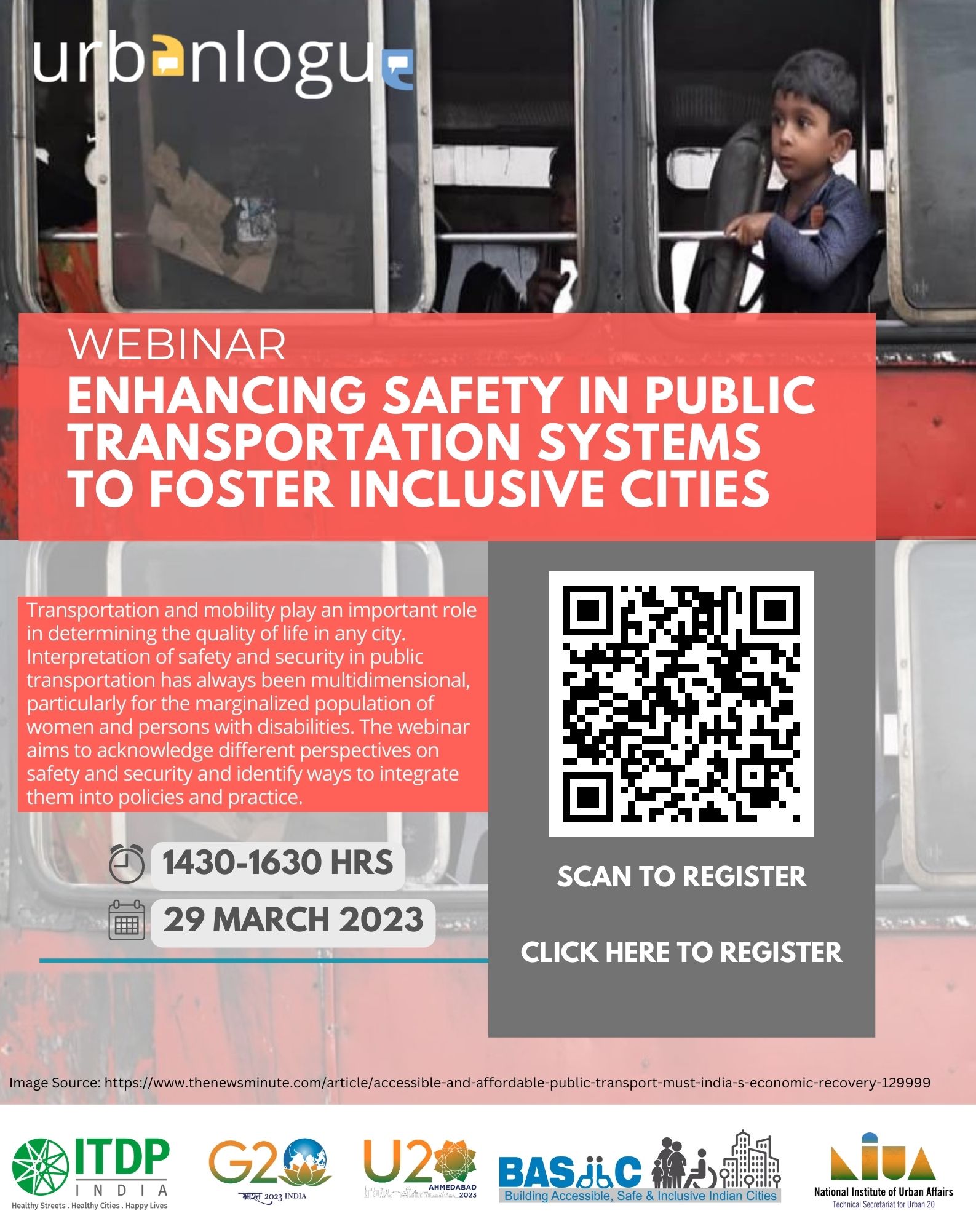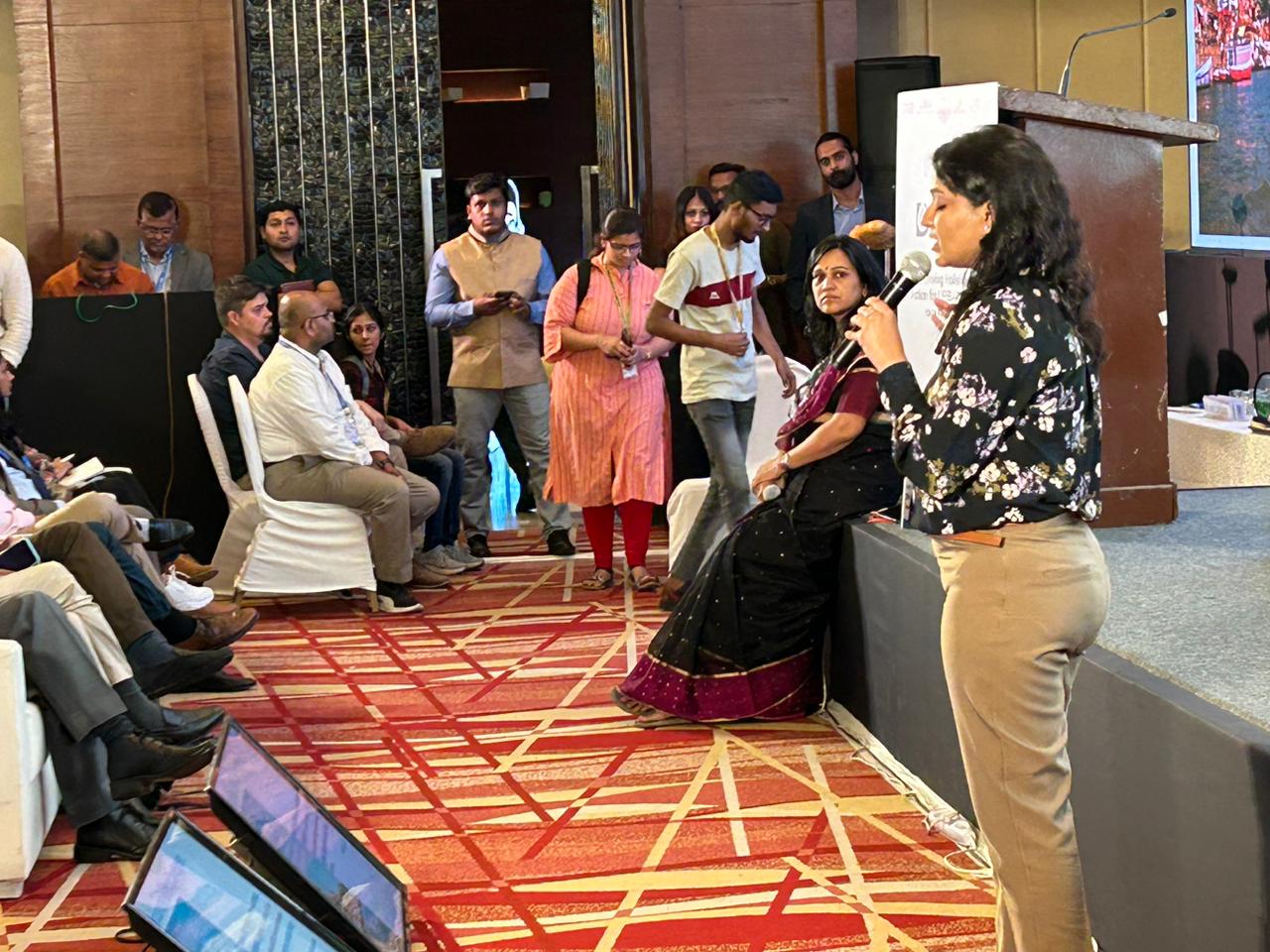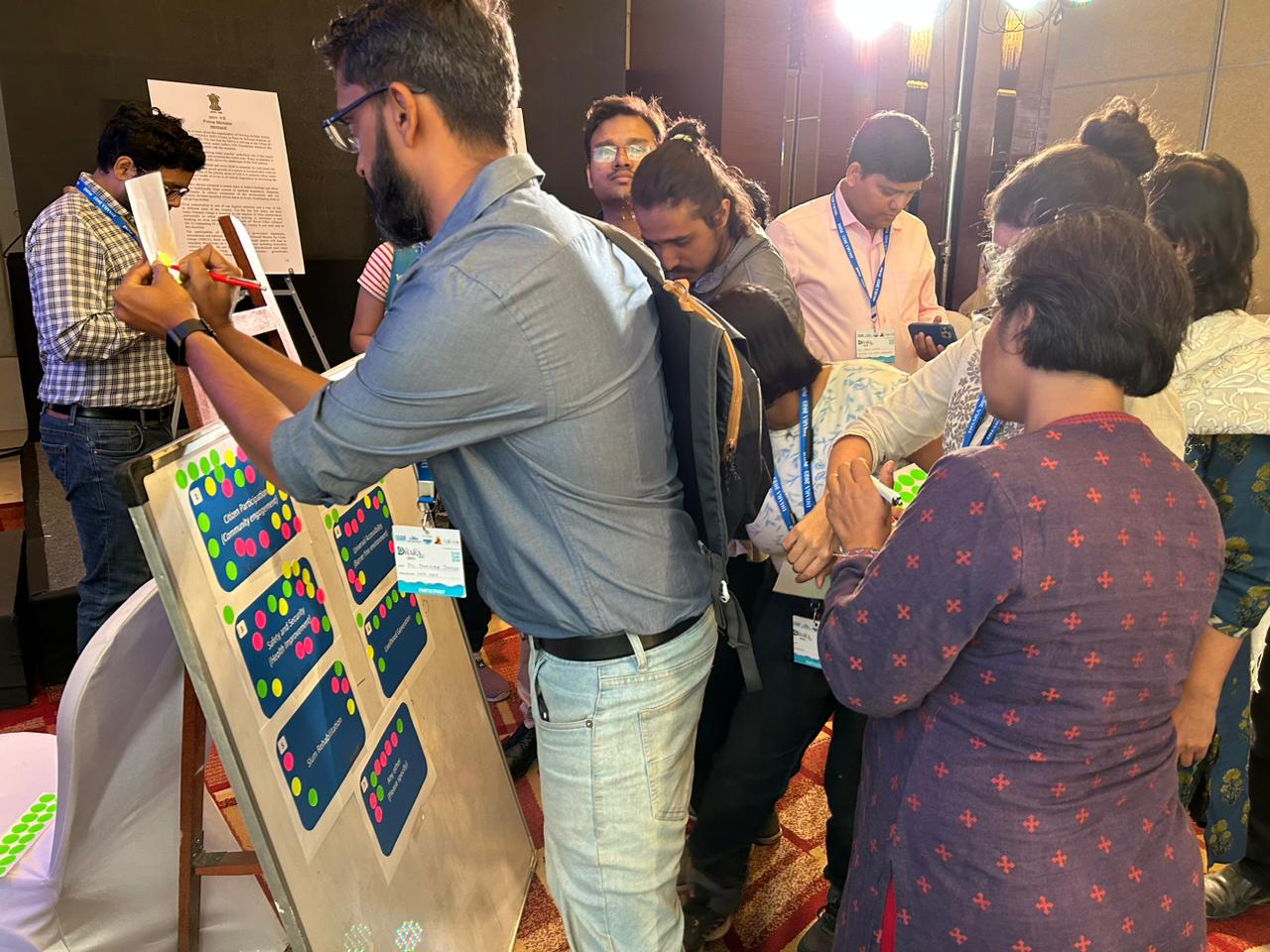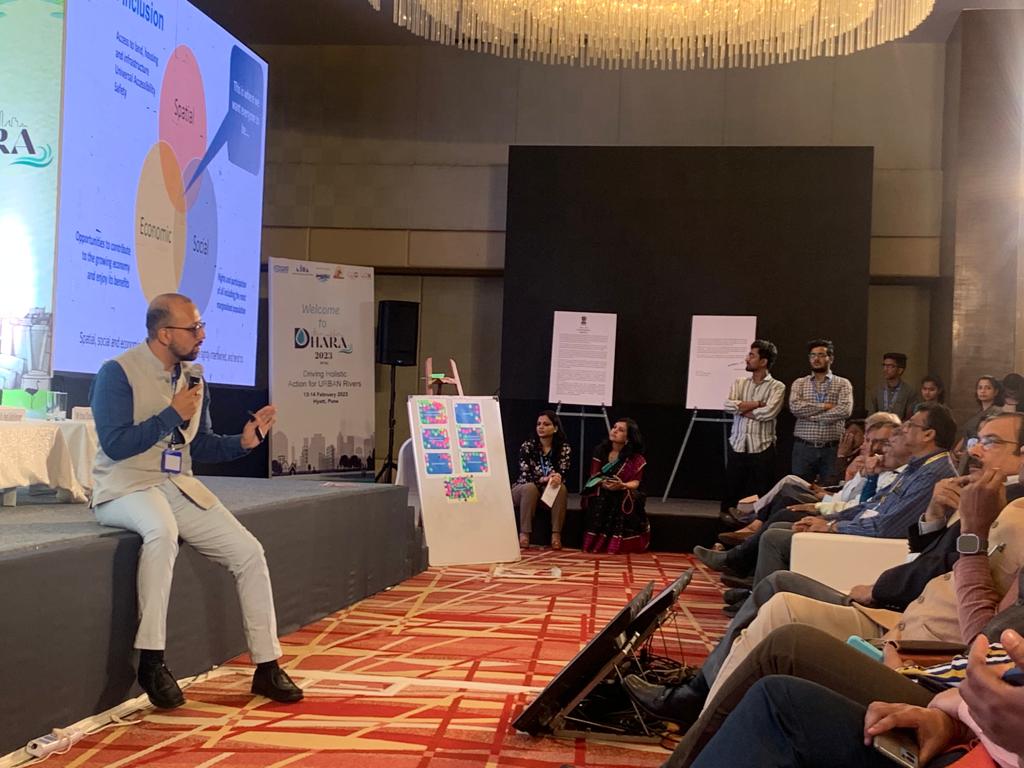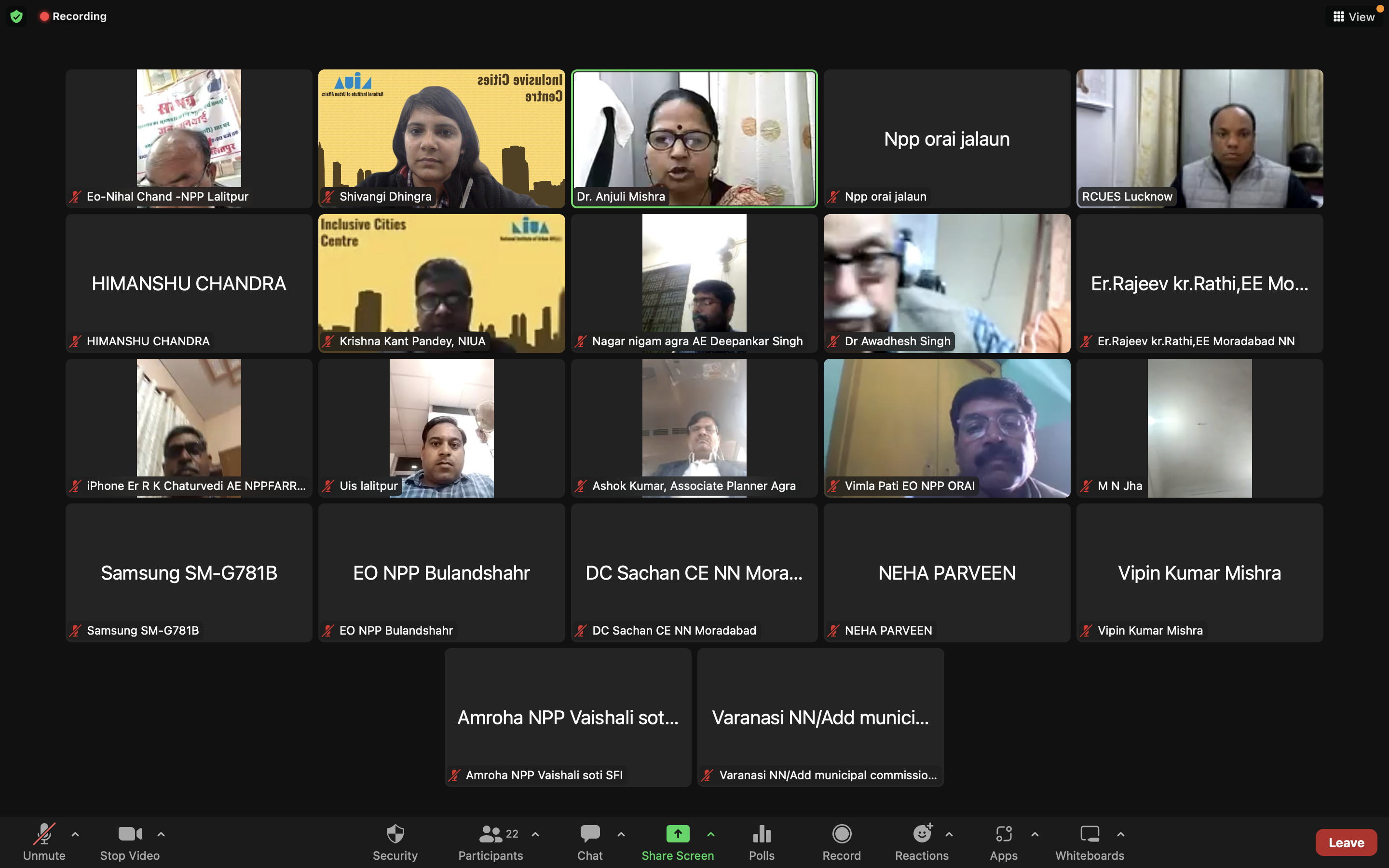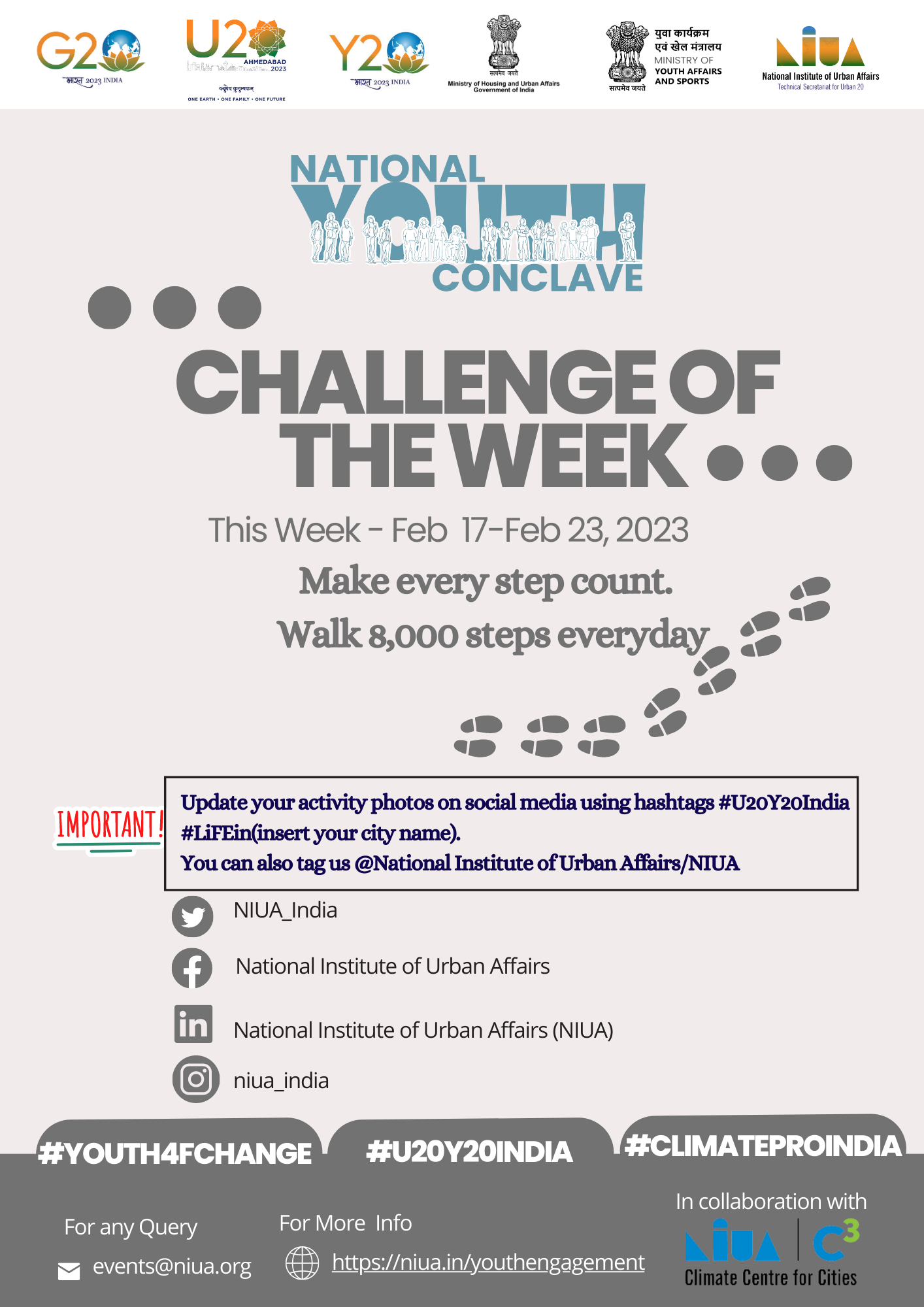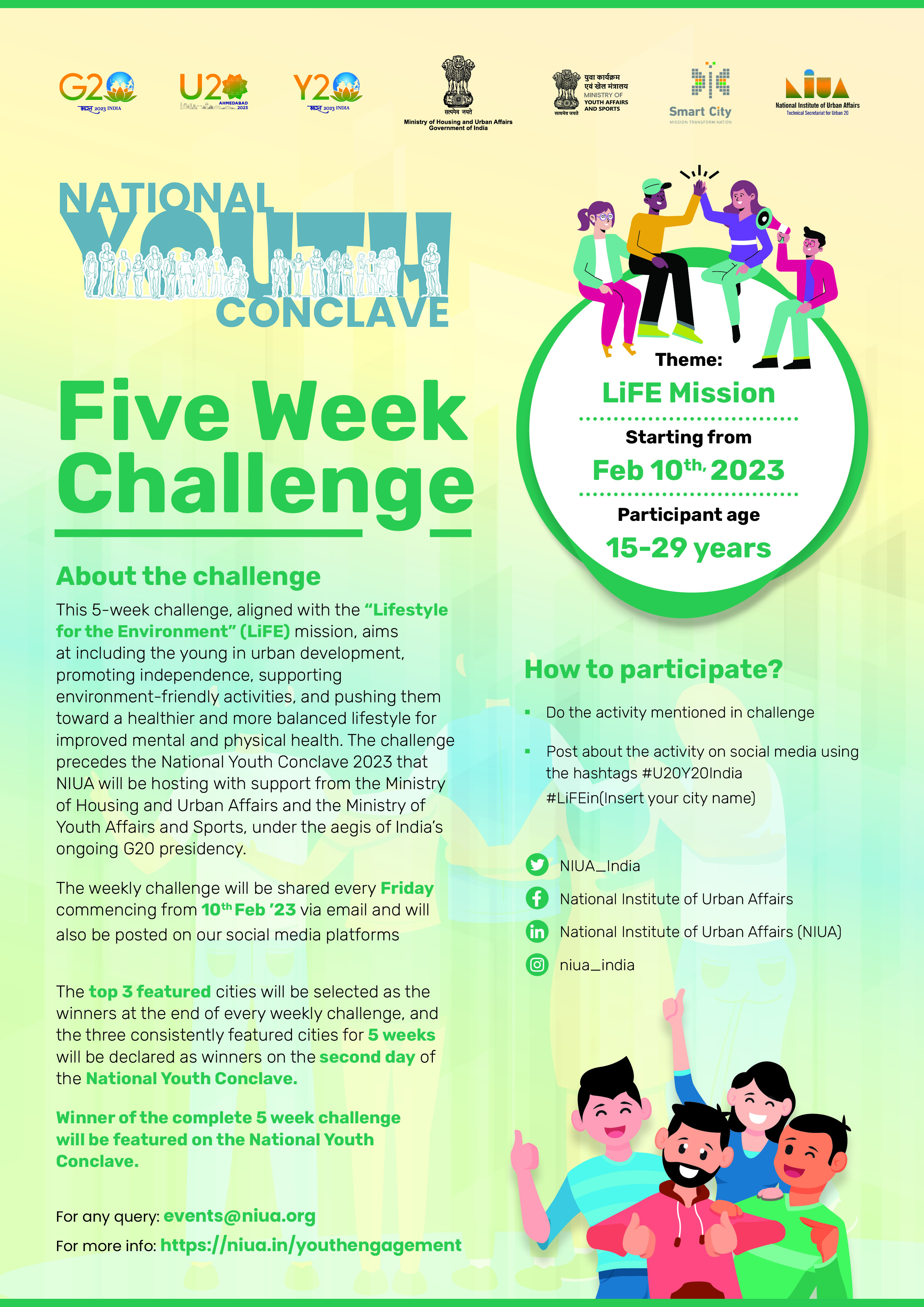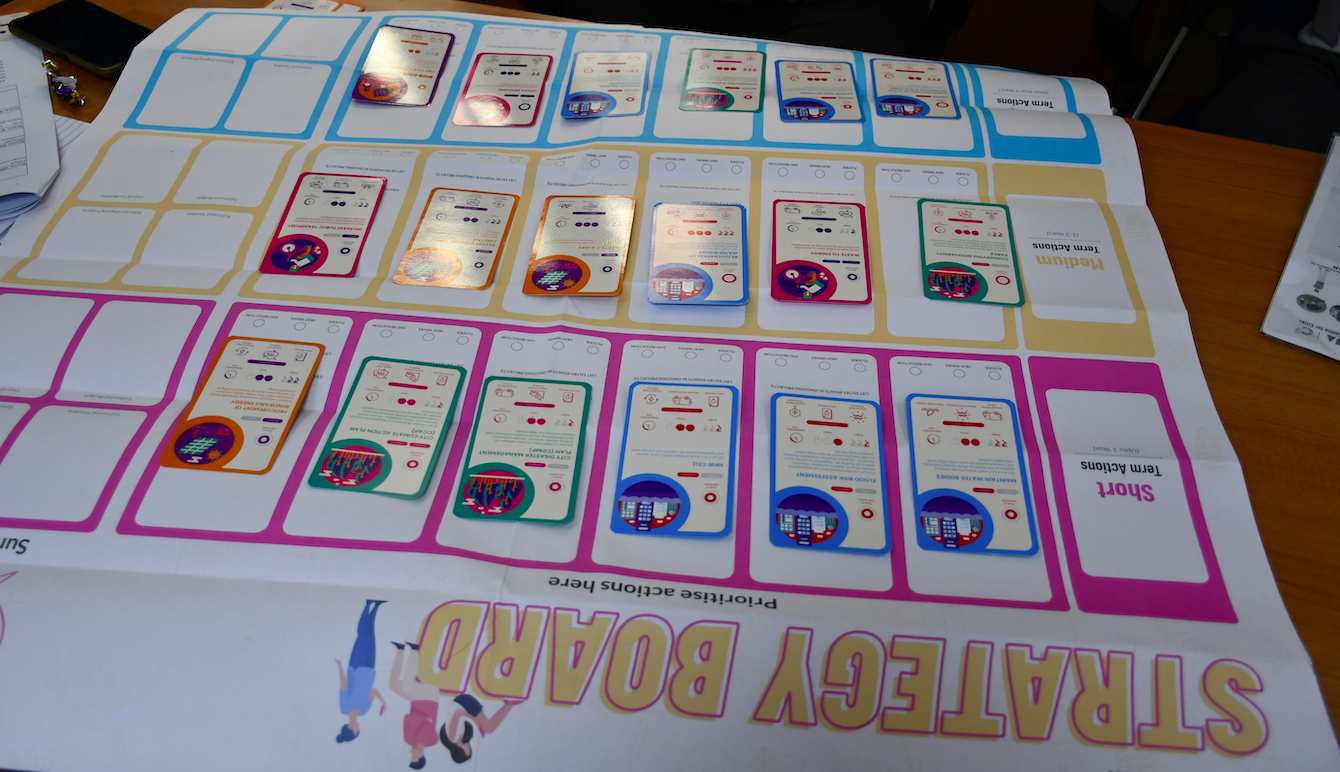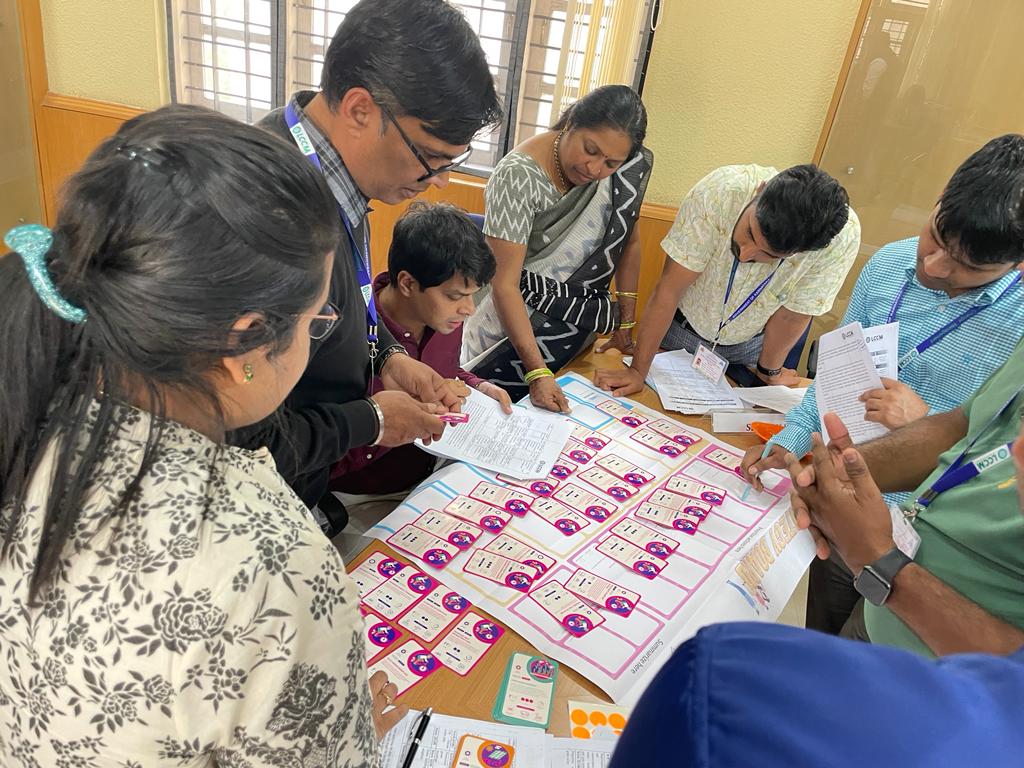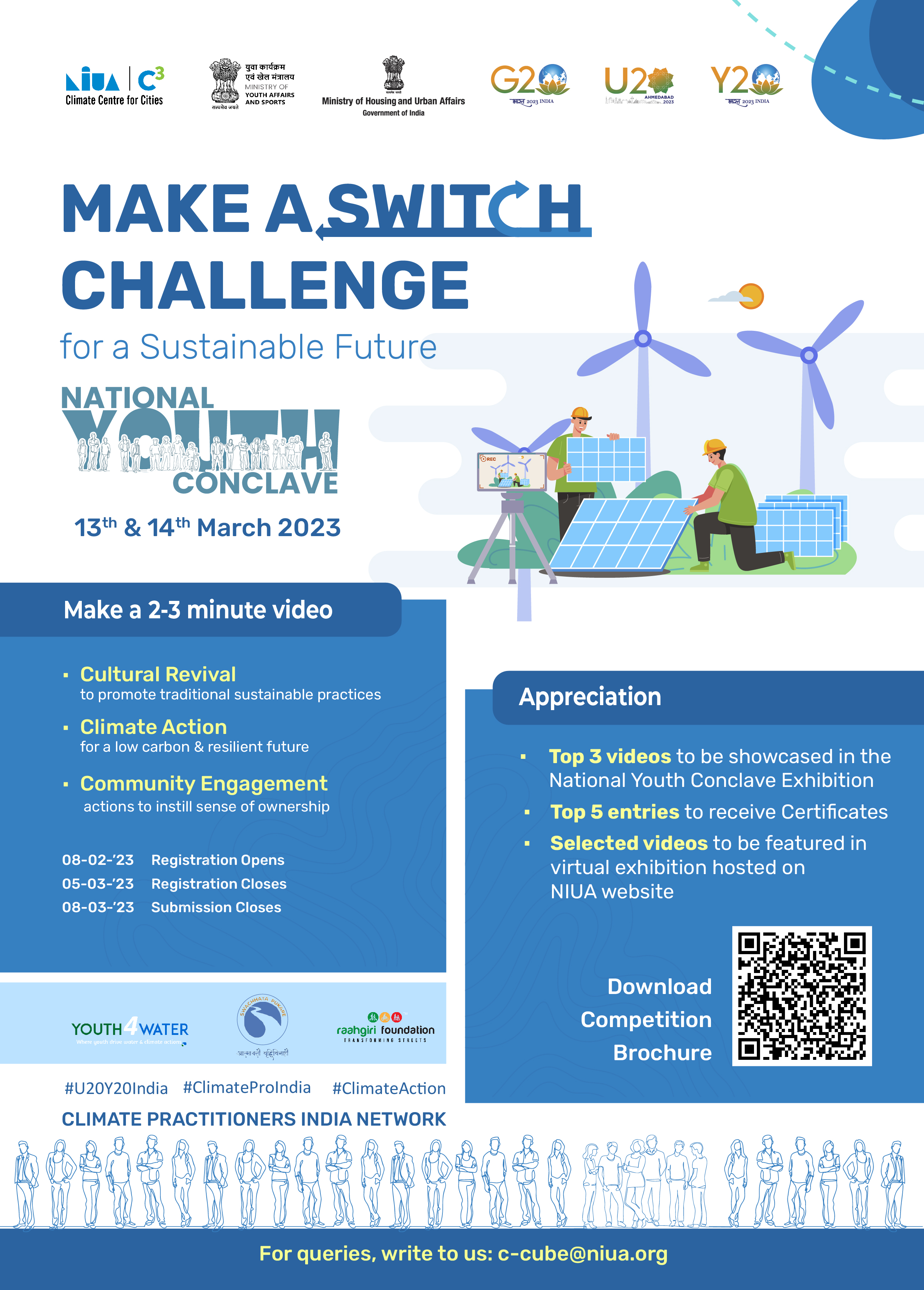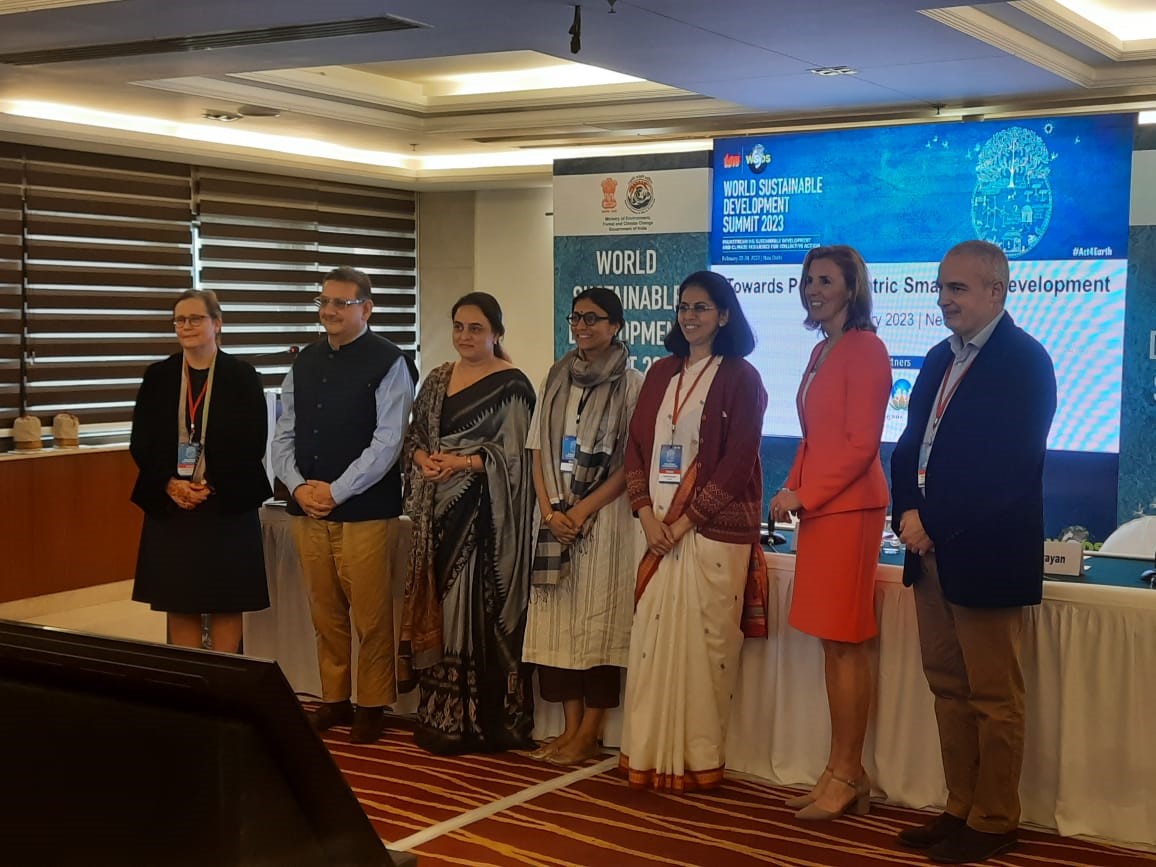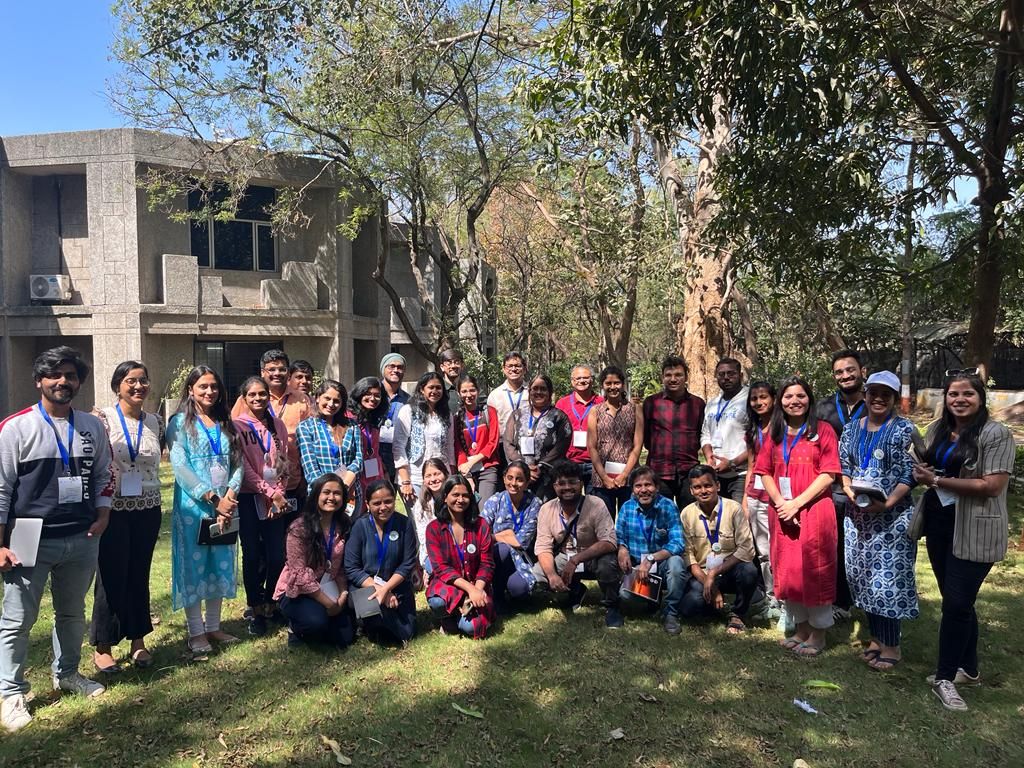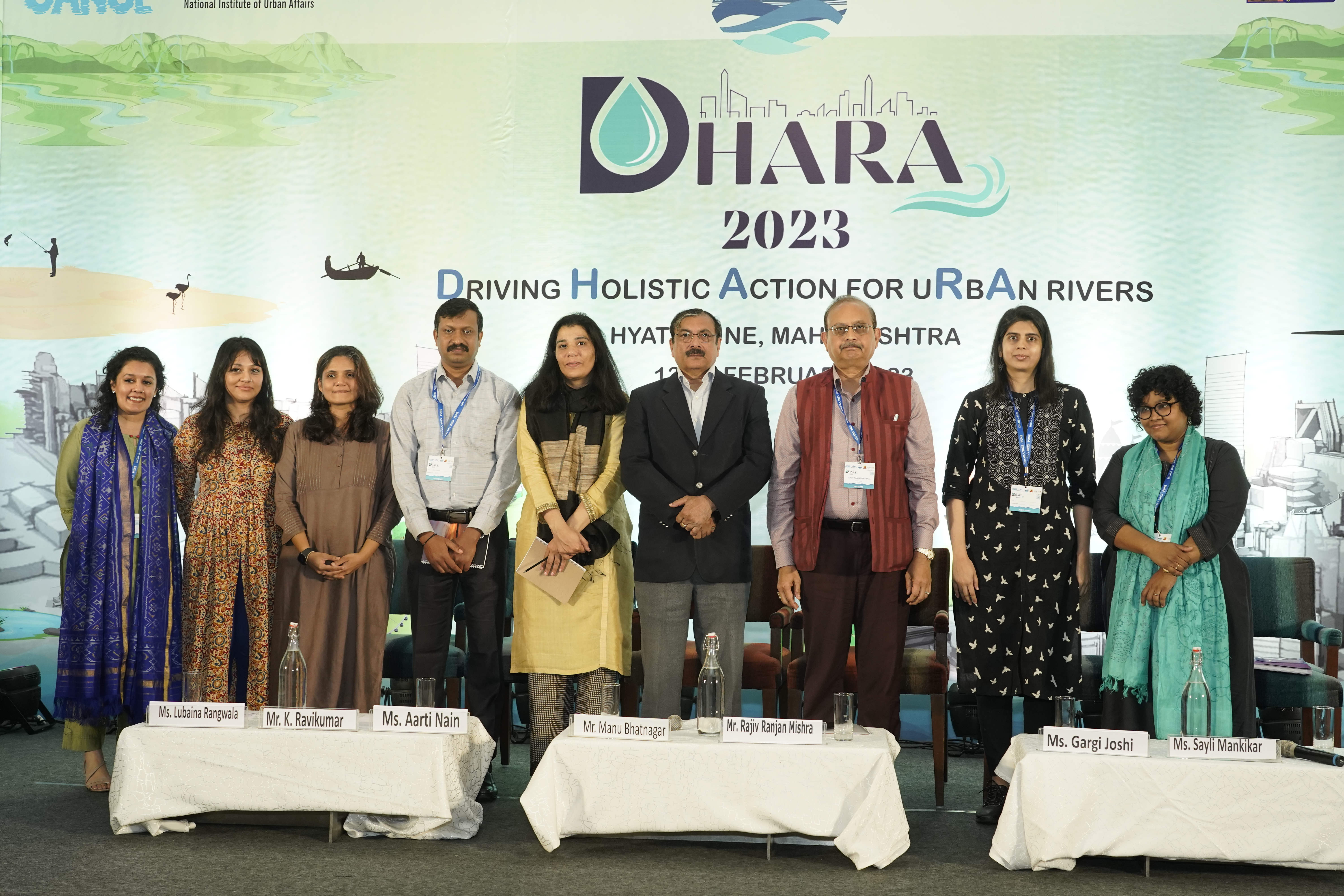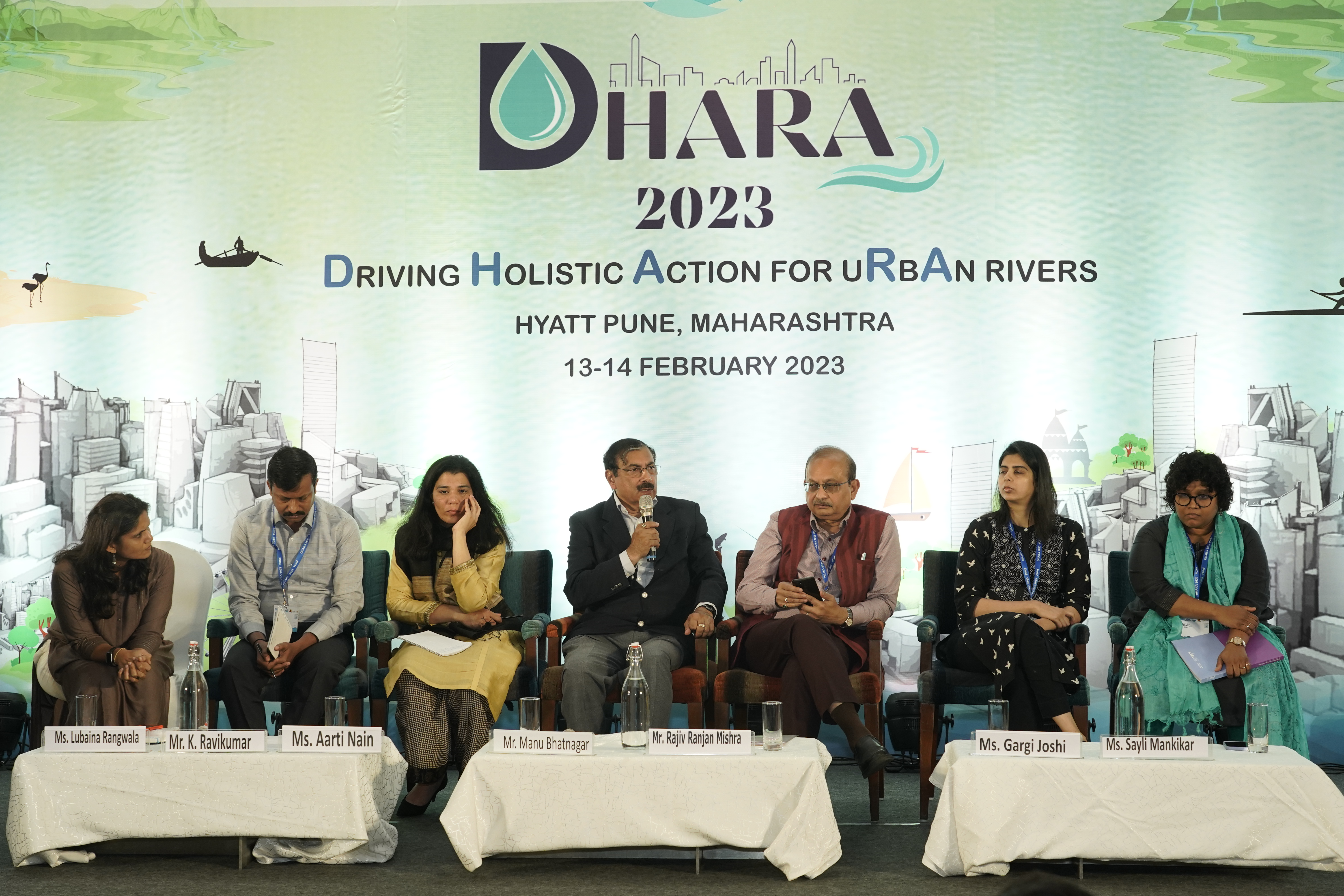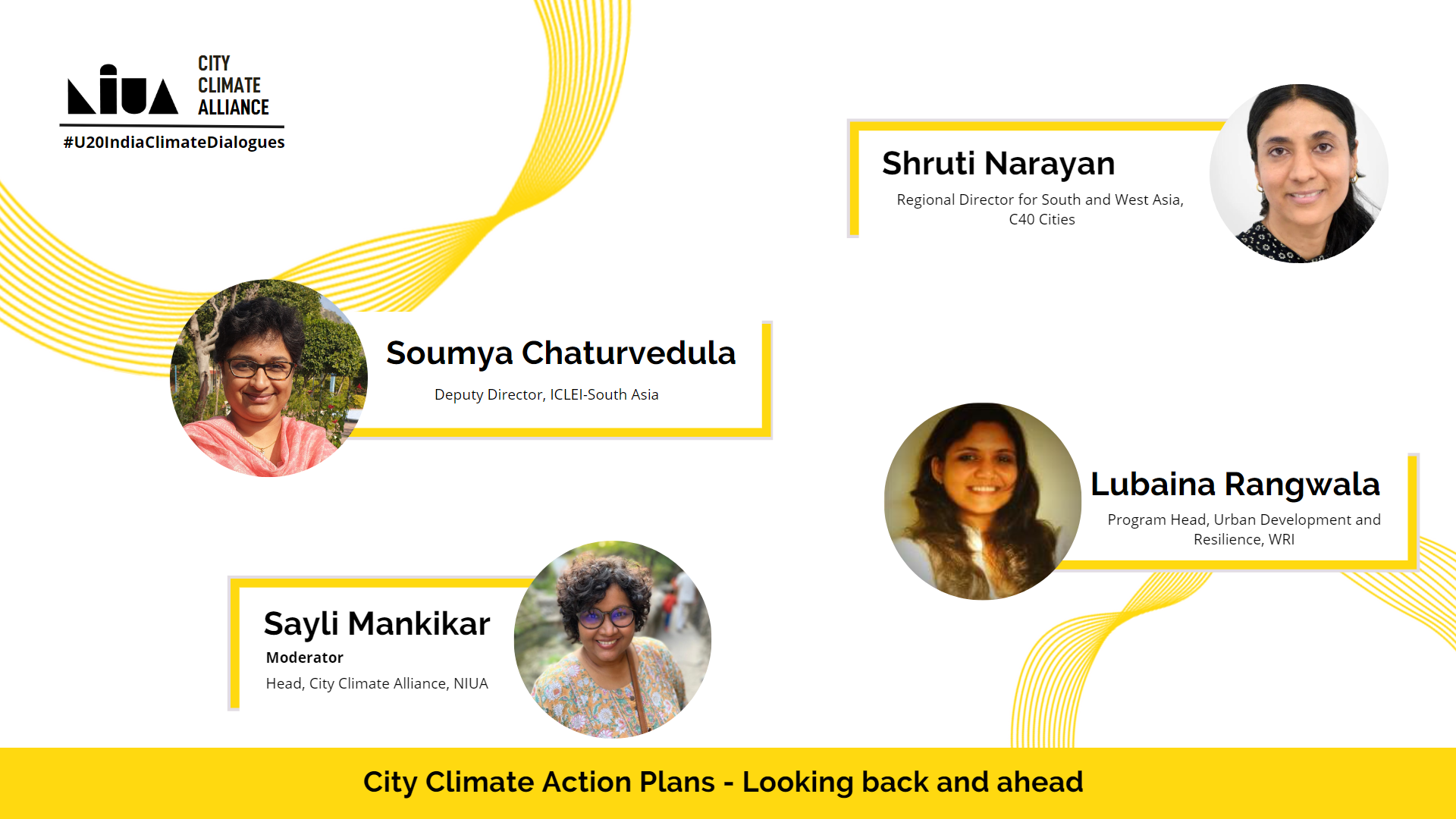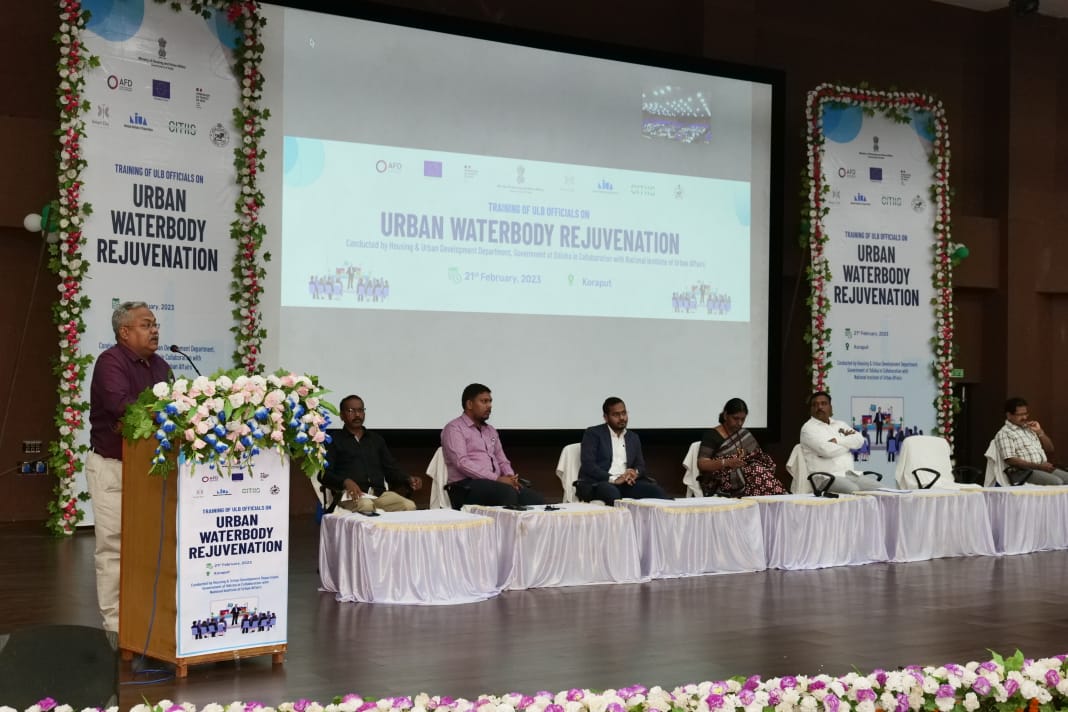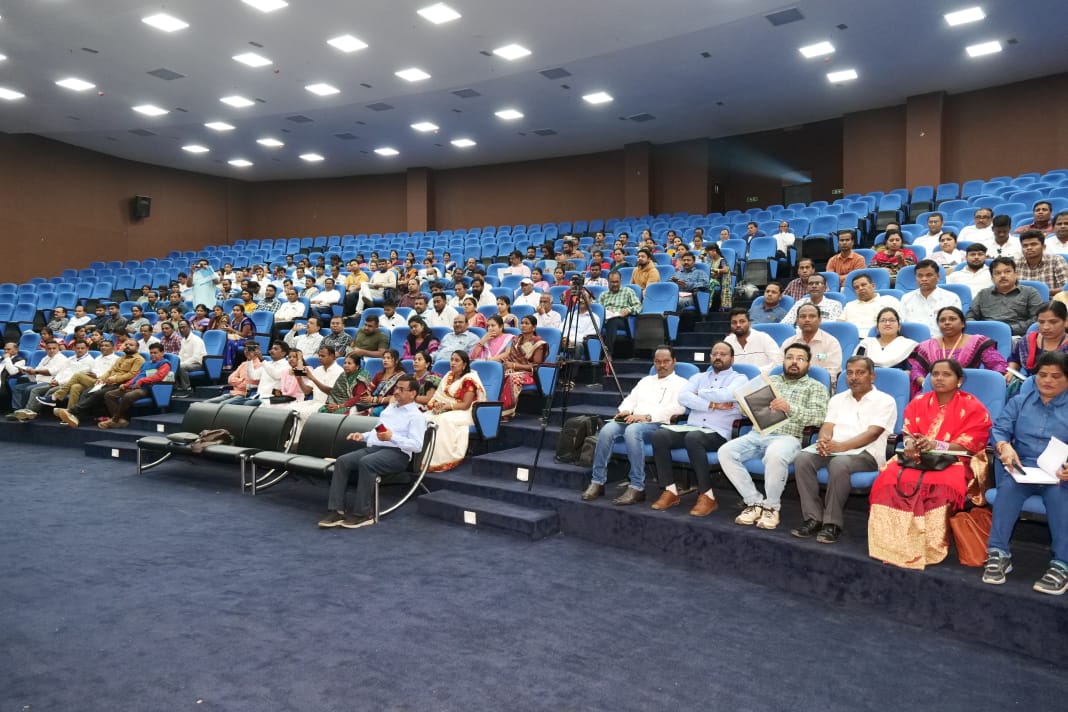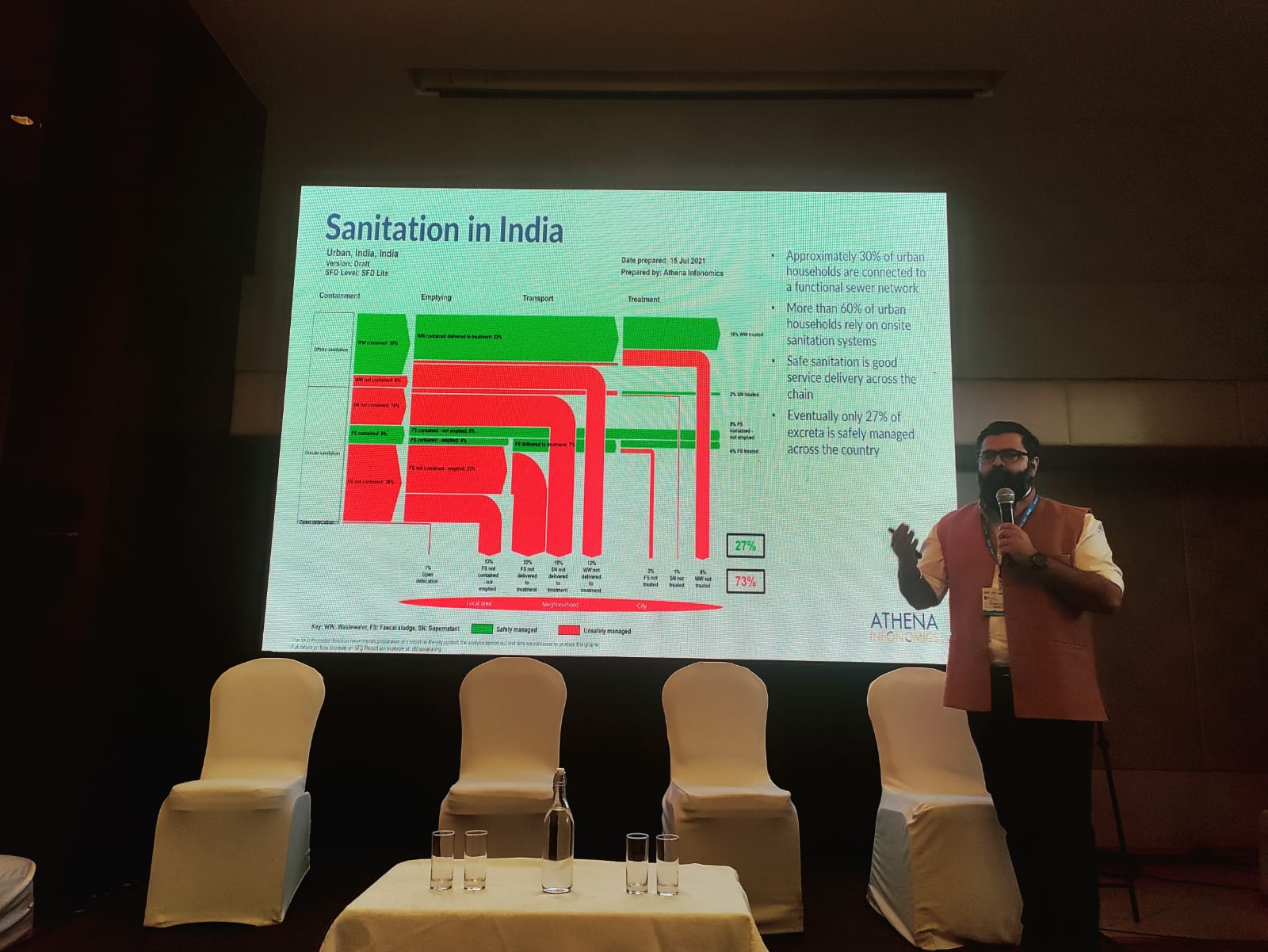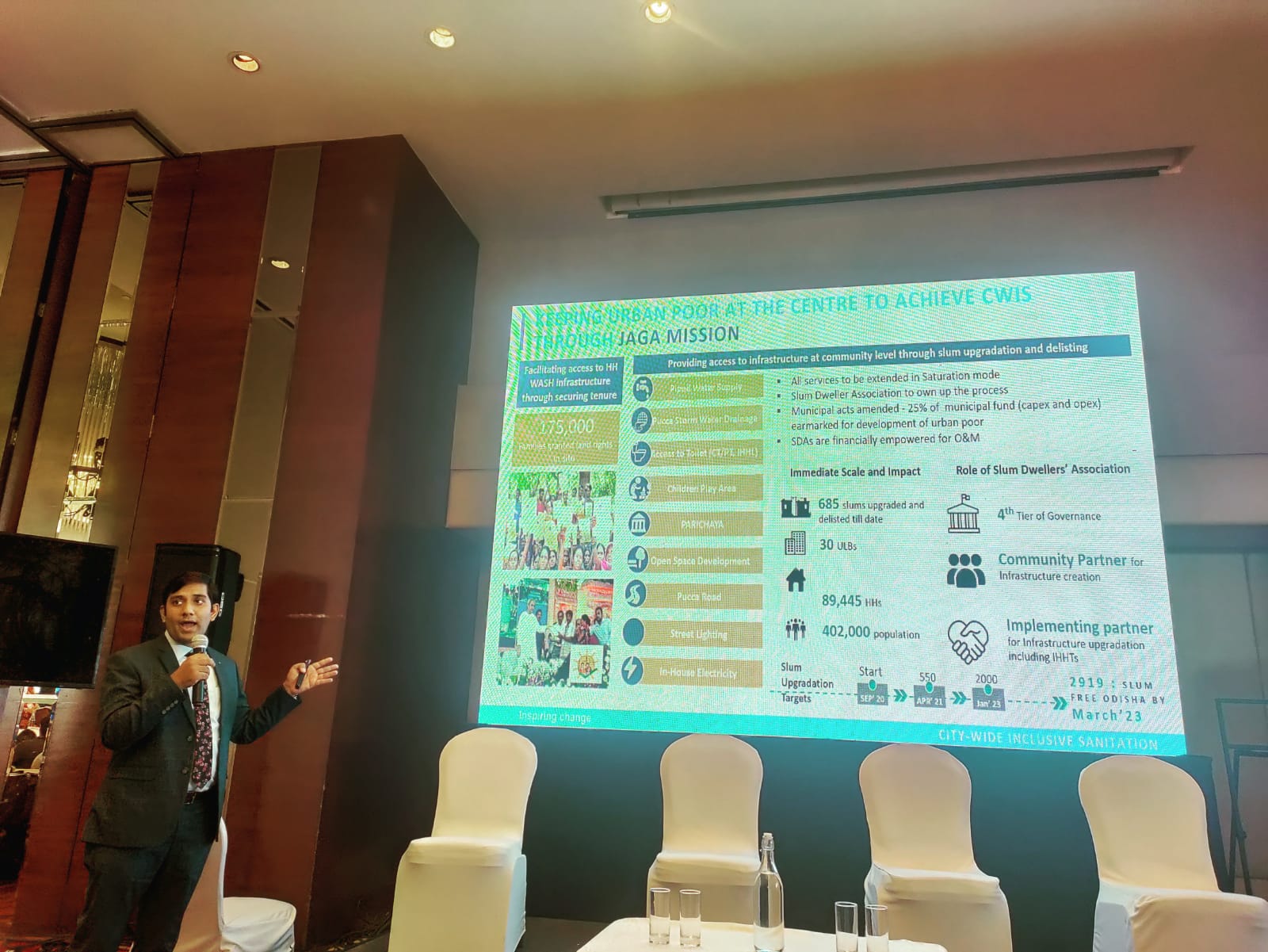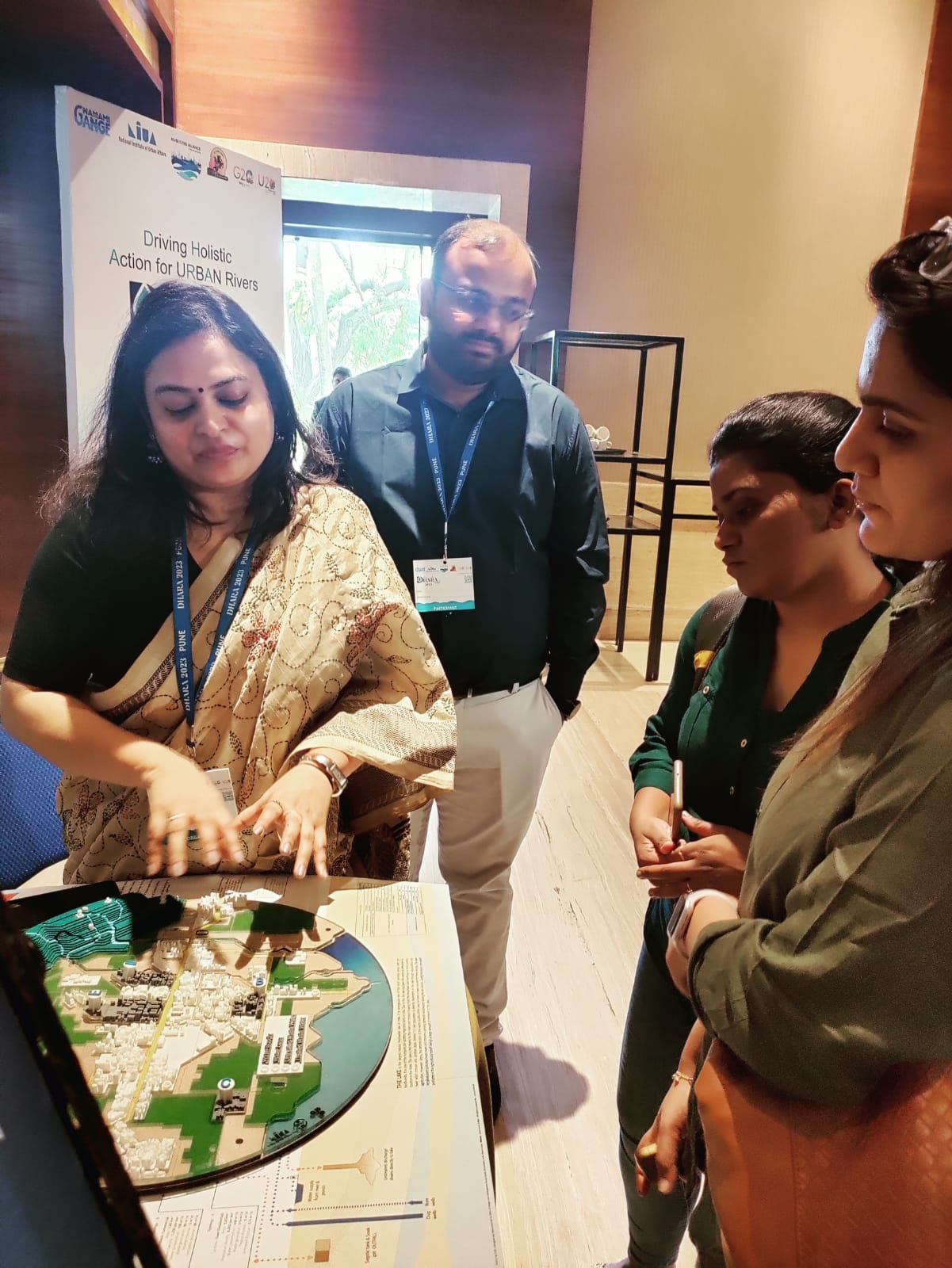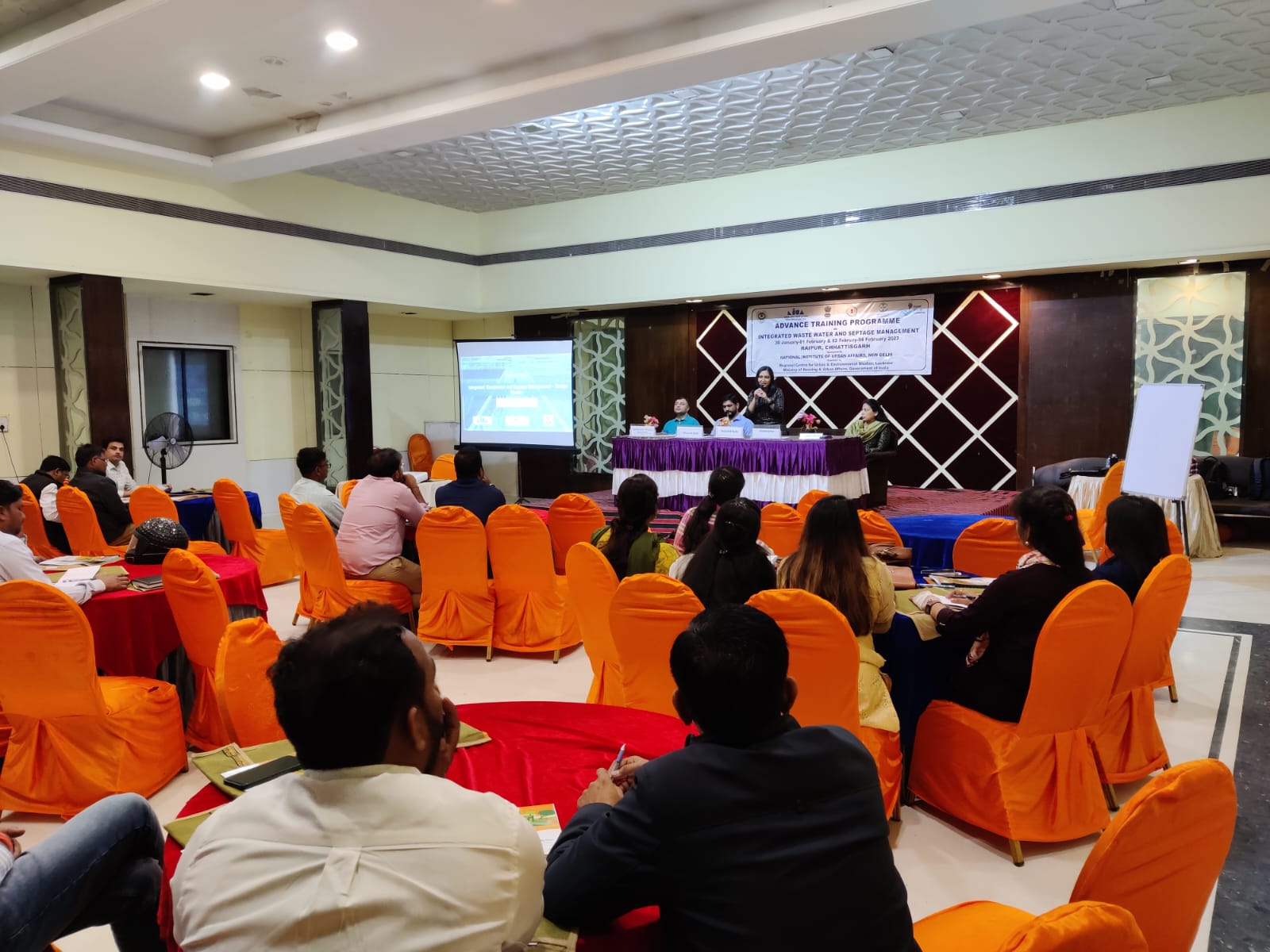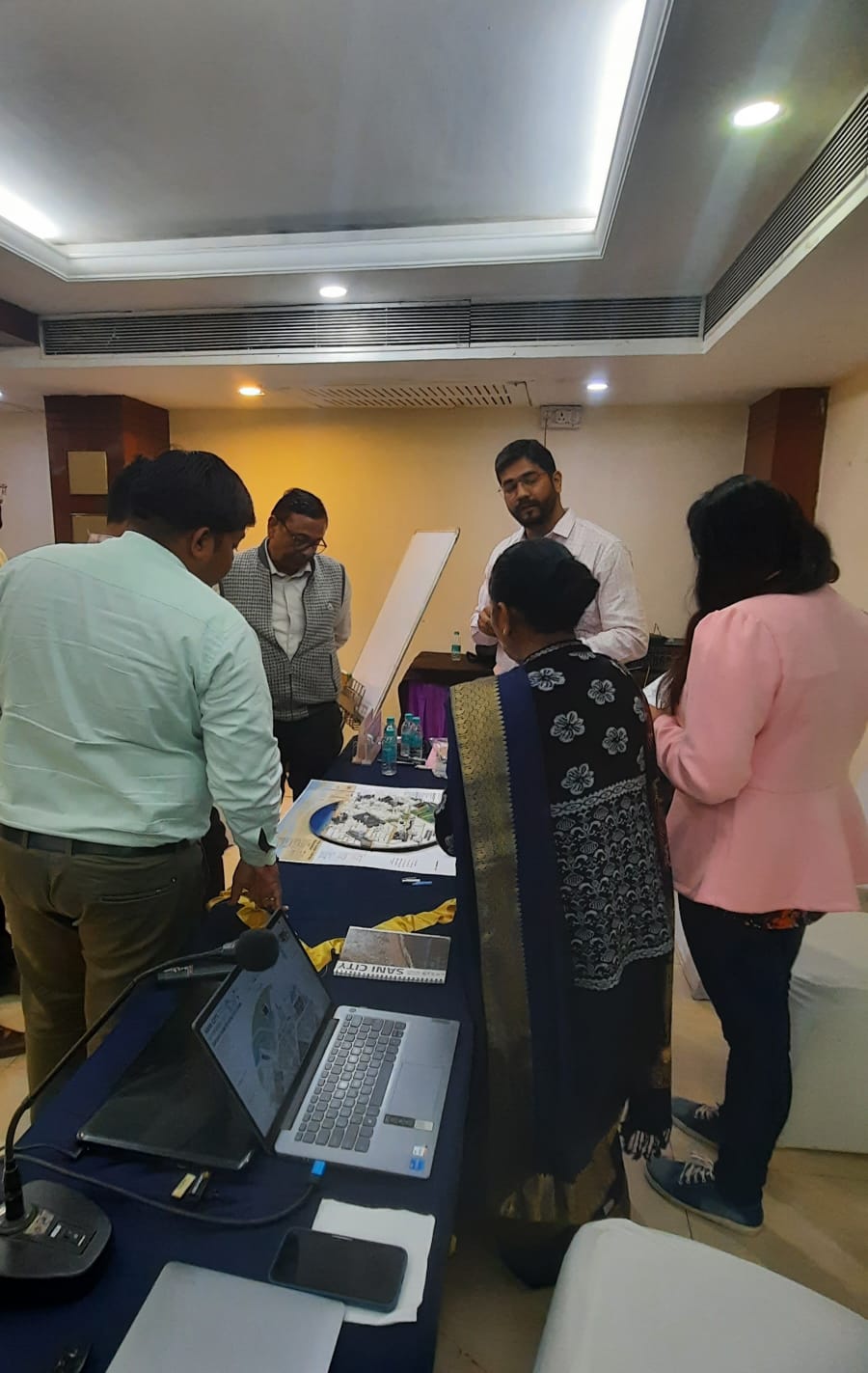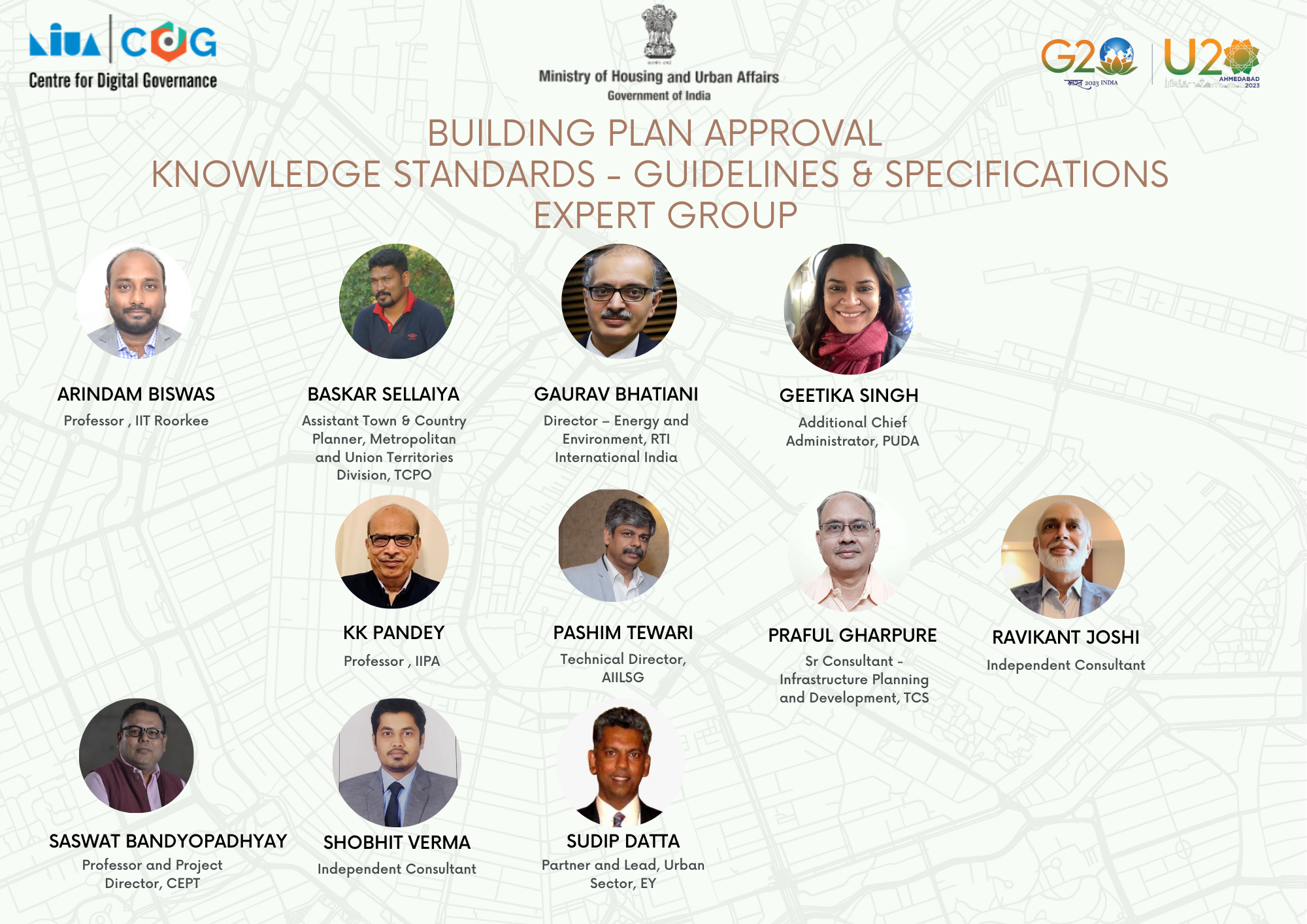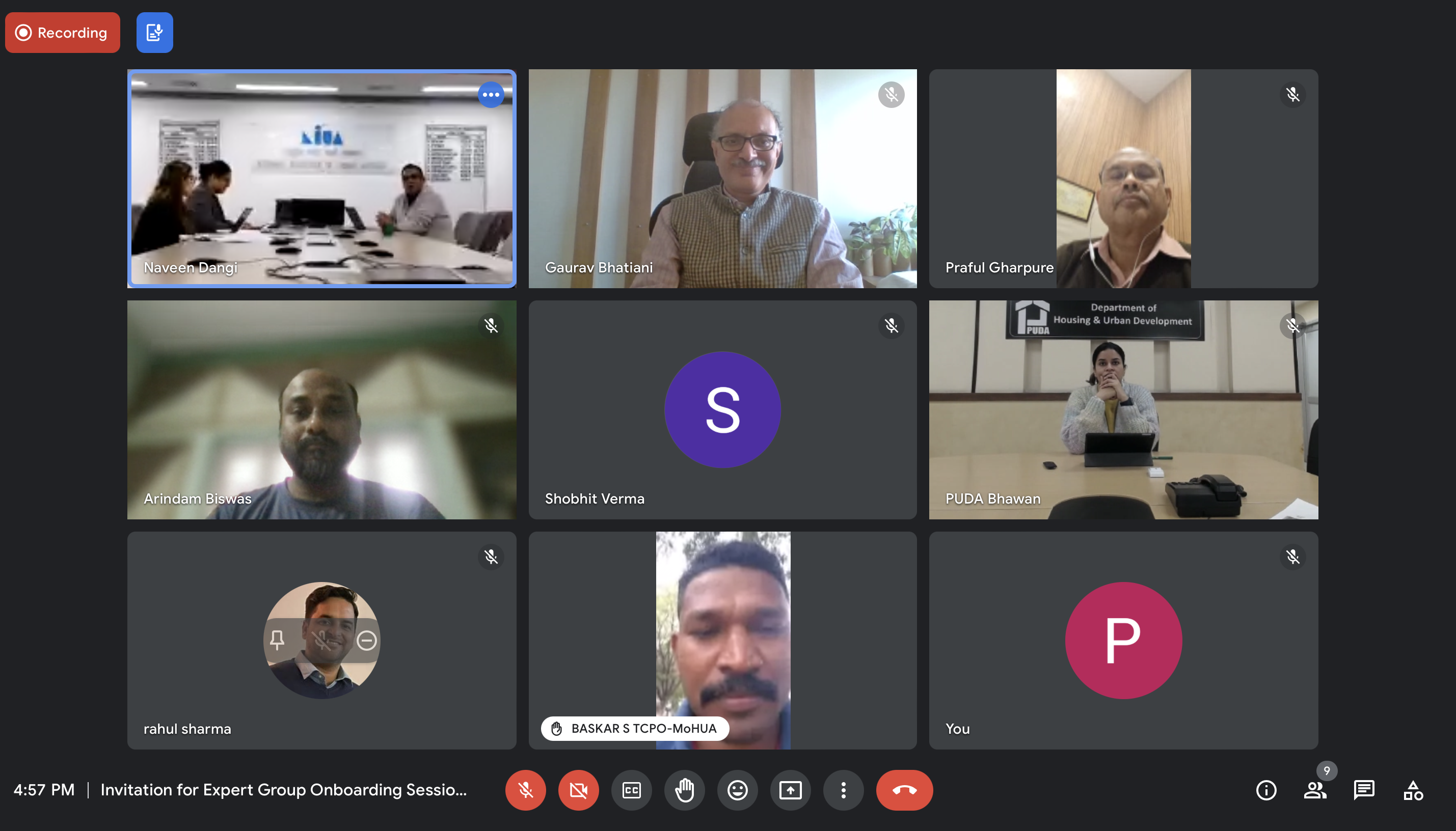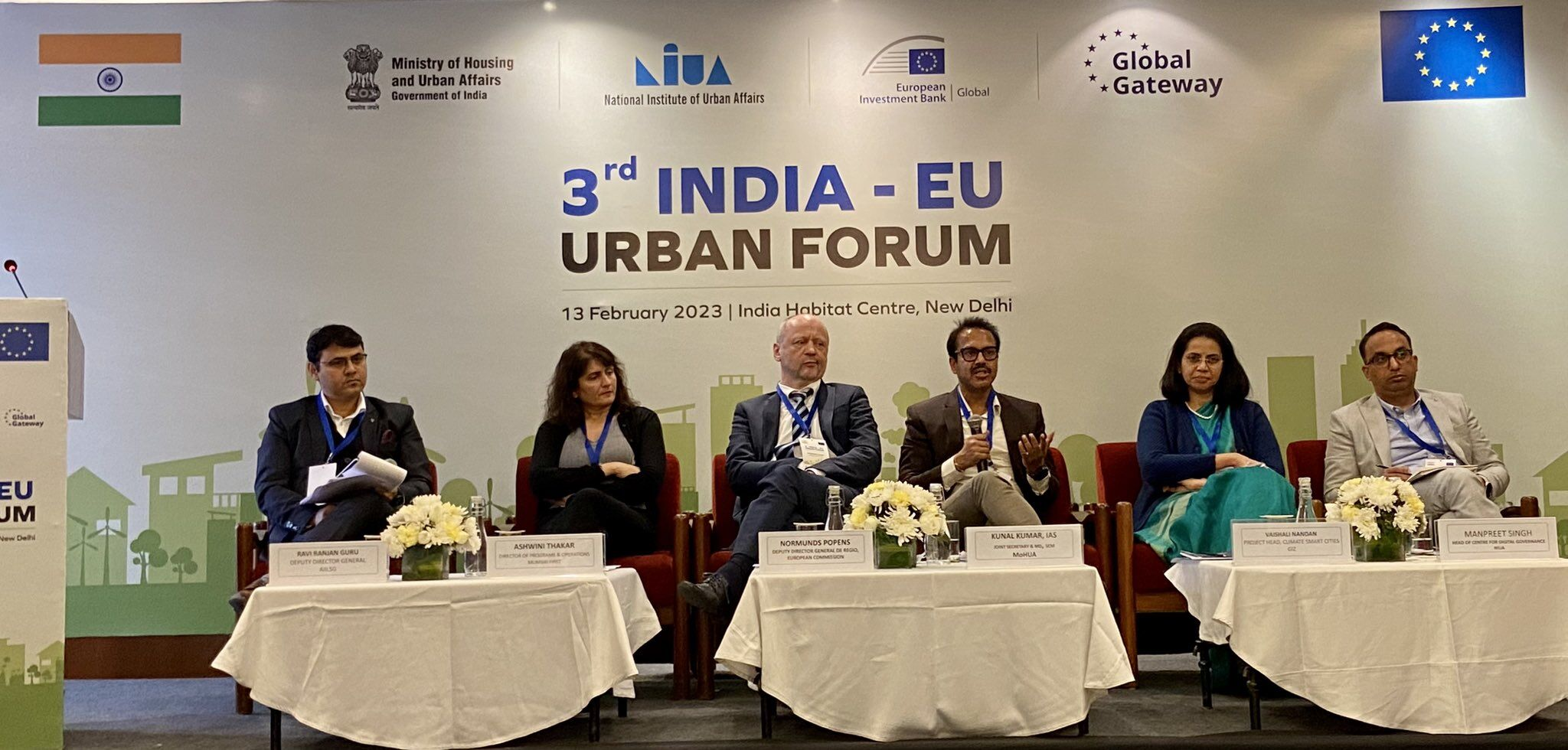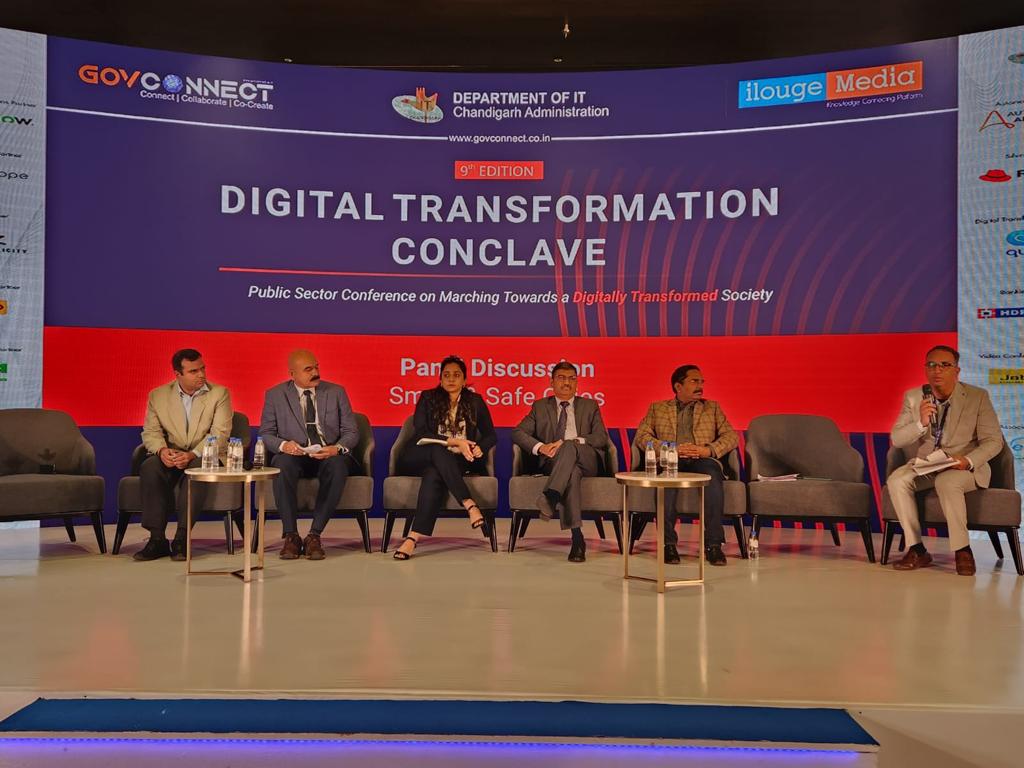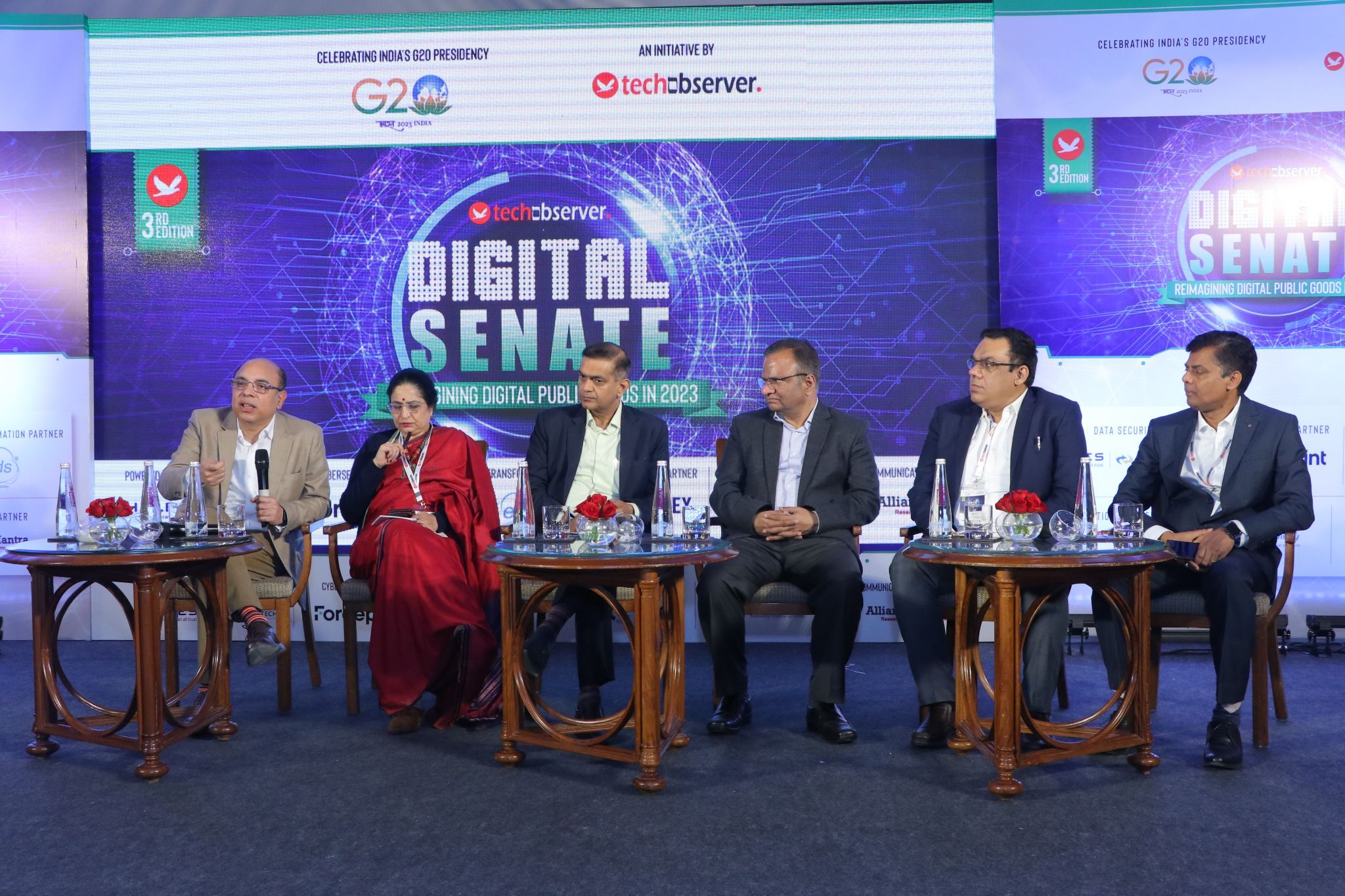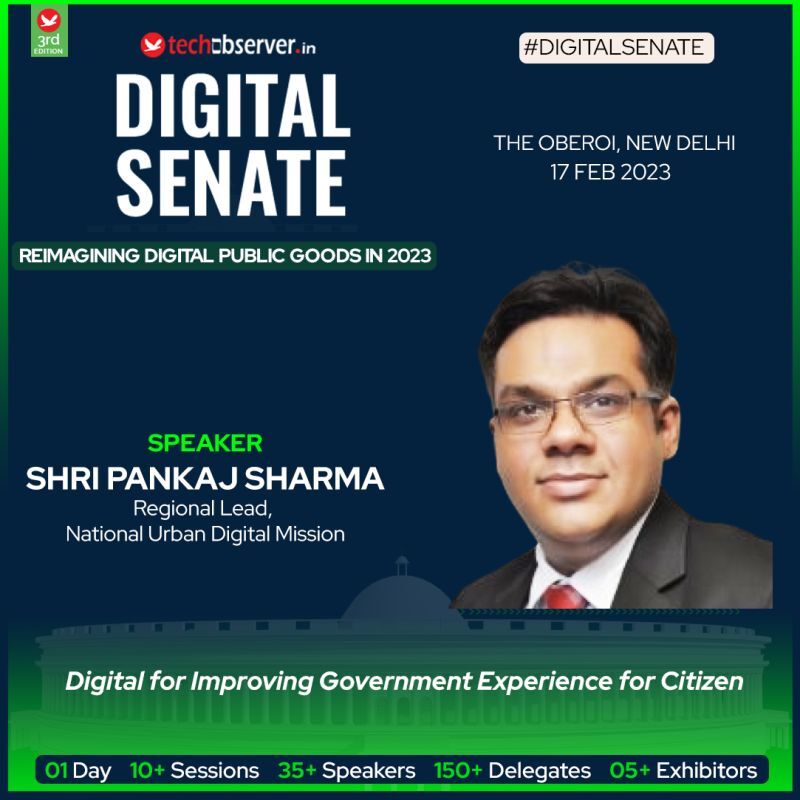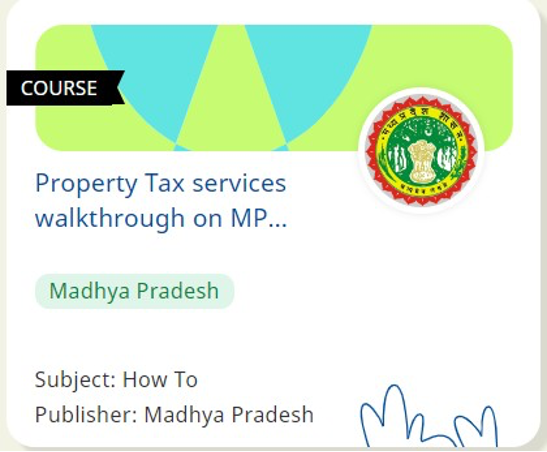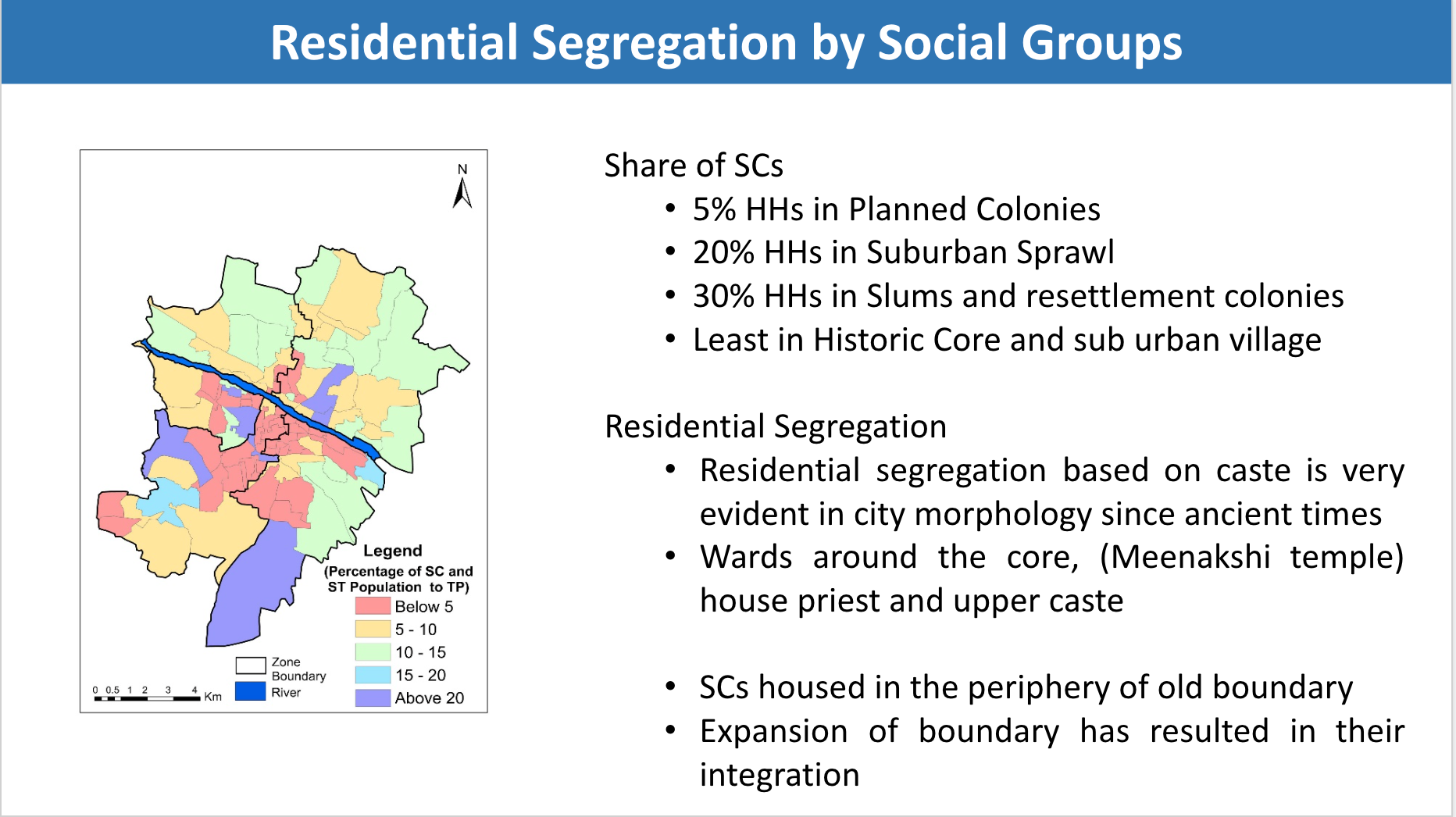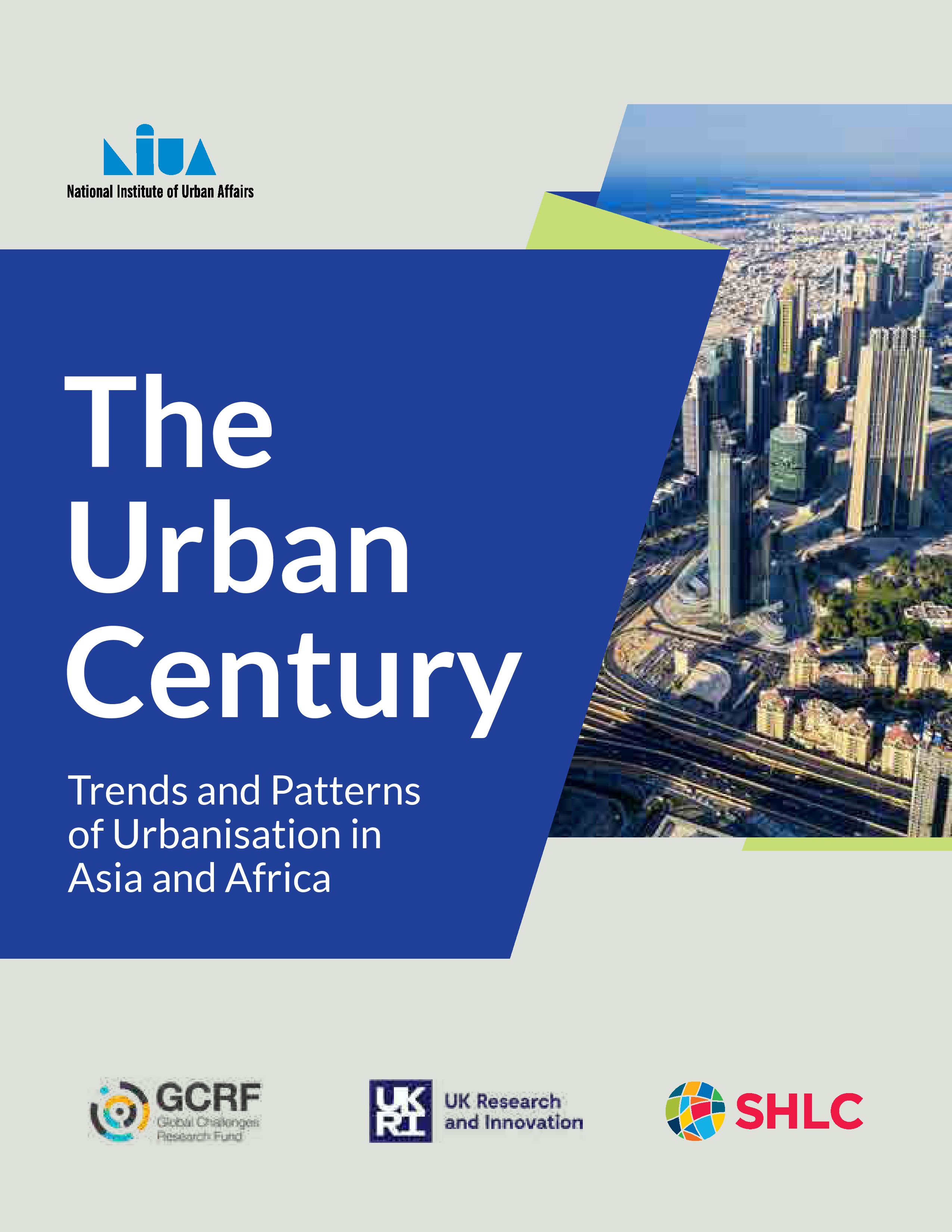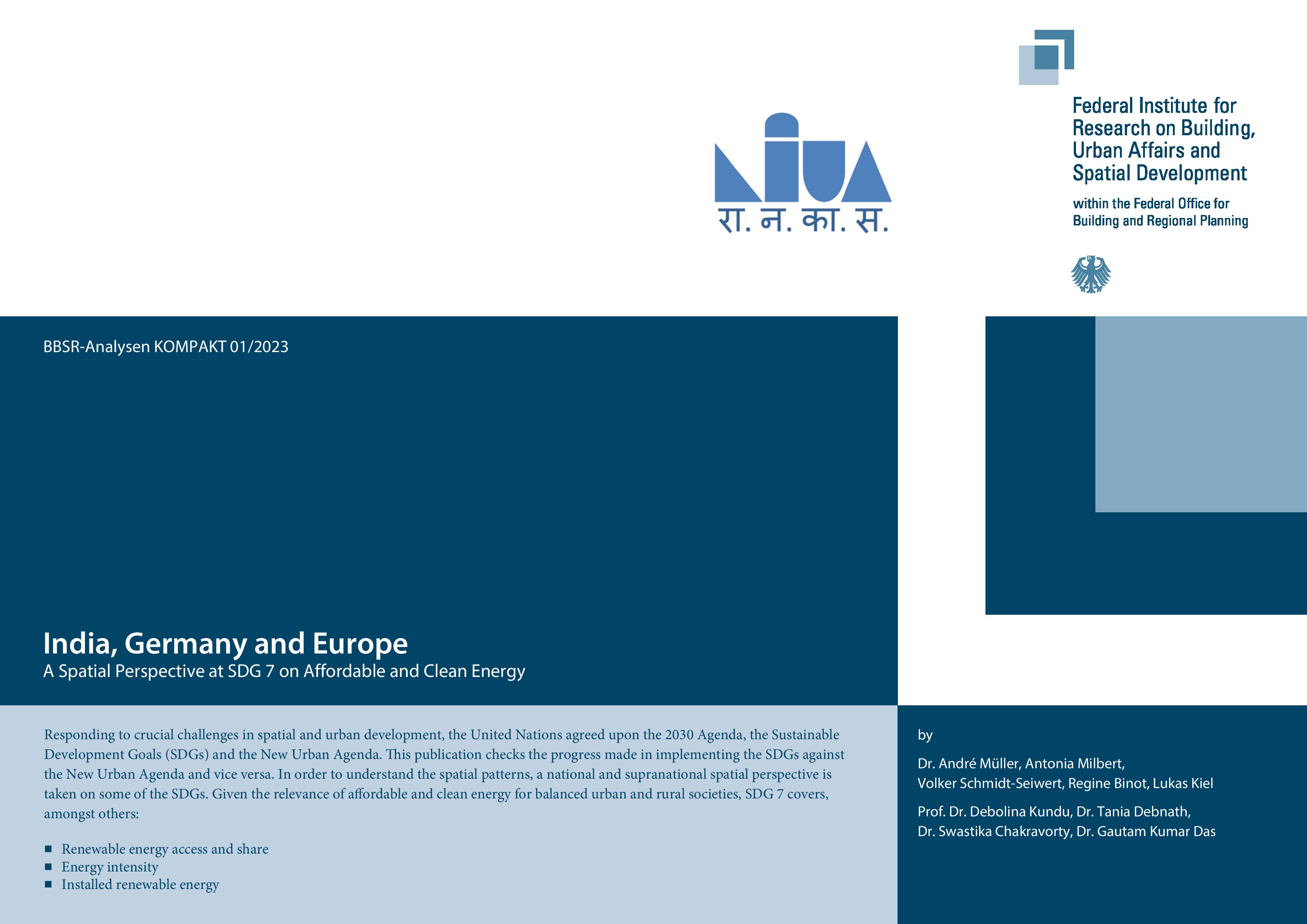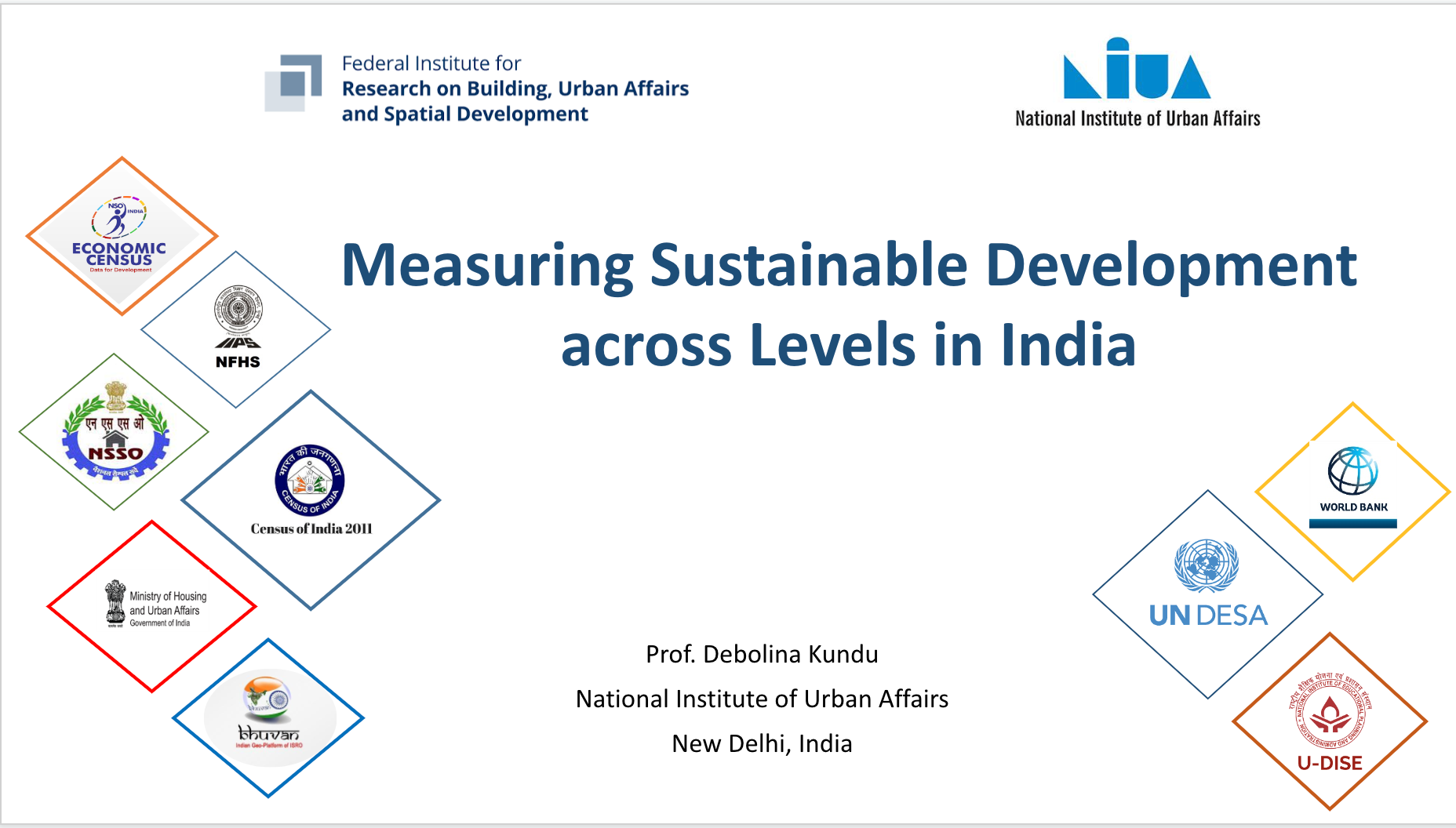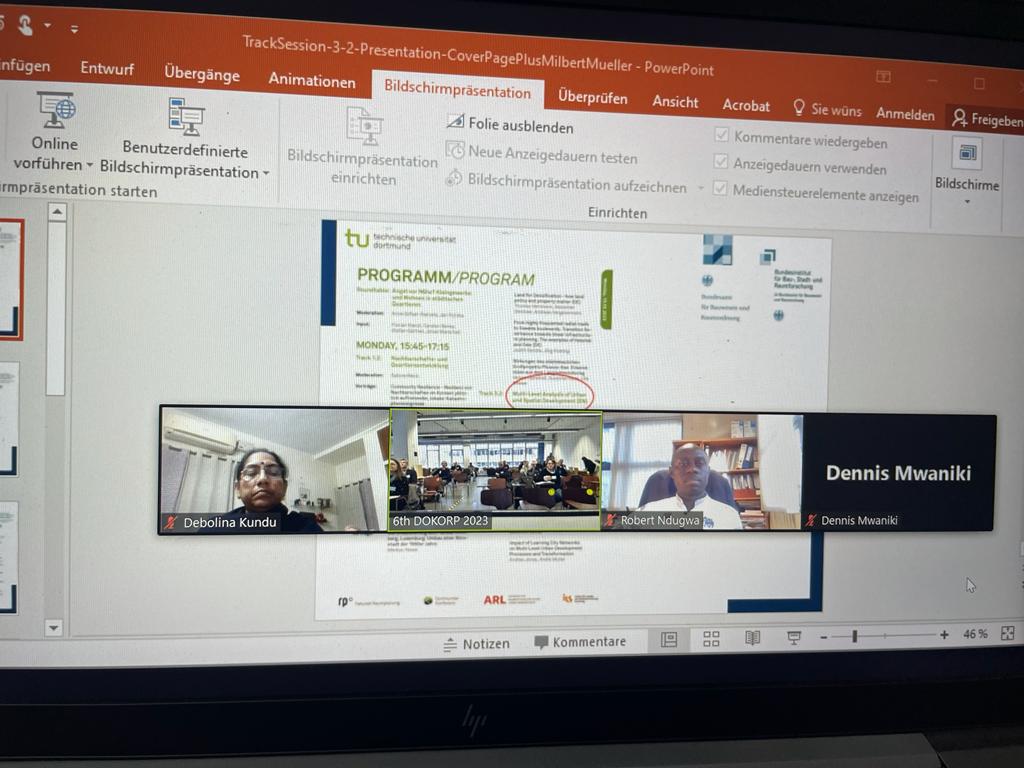
Issue - 7
February 2023
Monthly
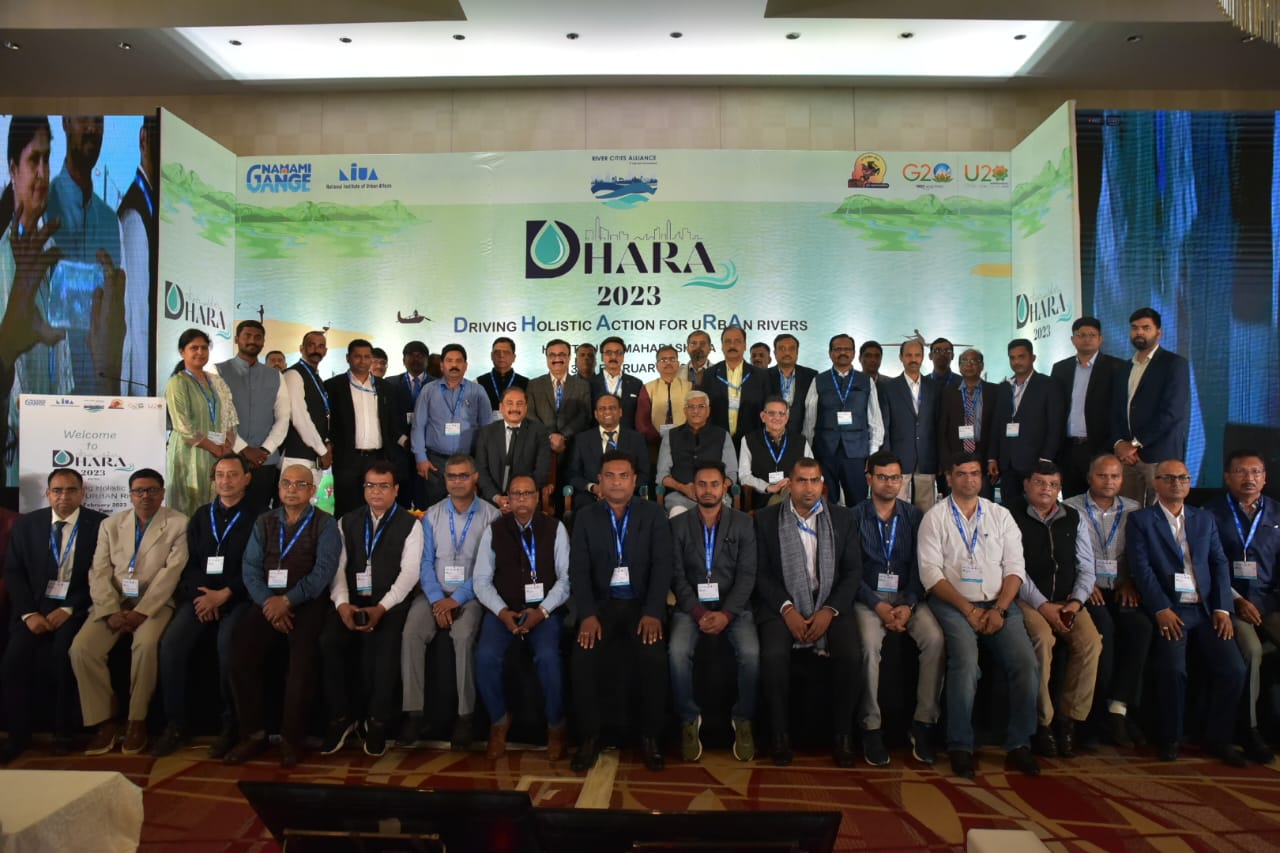
Municipal Commissioners and city officials with Hon'ble Minister of Jal Shakti Shri Gajendra Singh Shekhawat
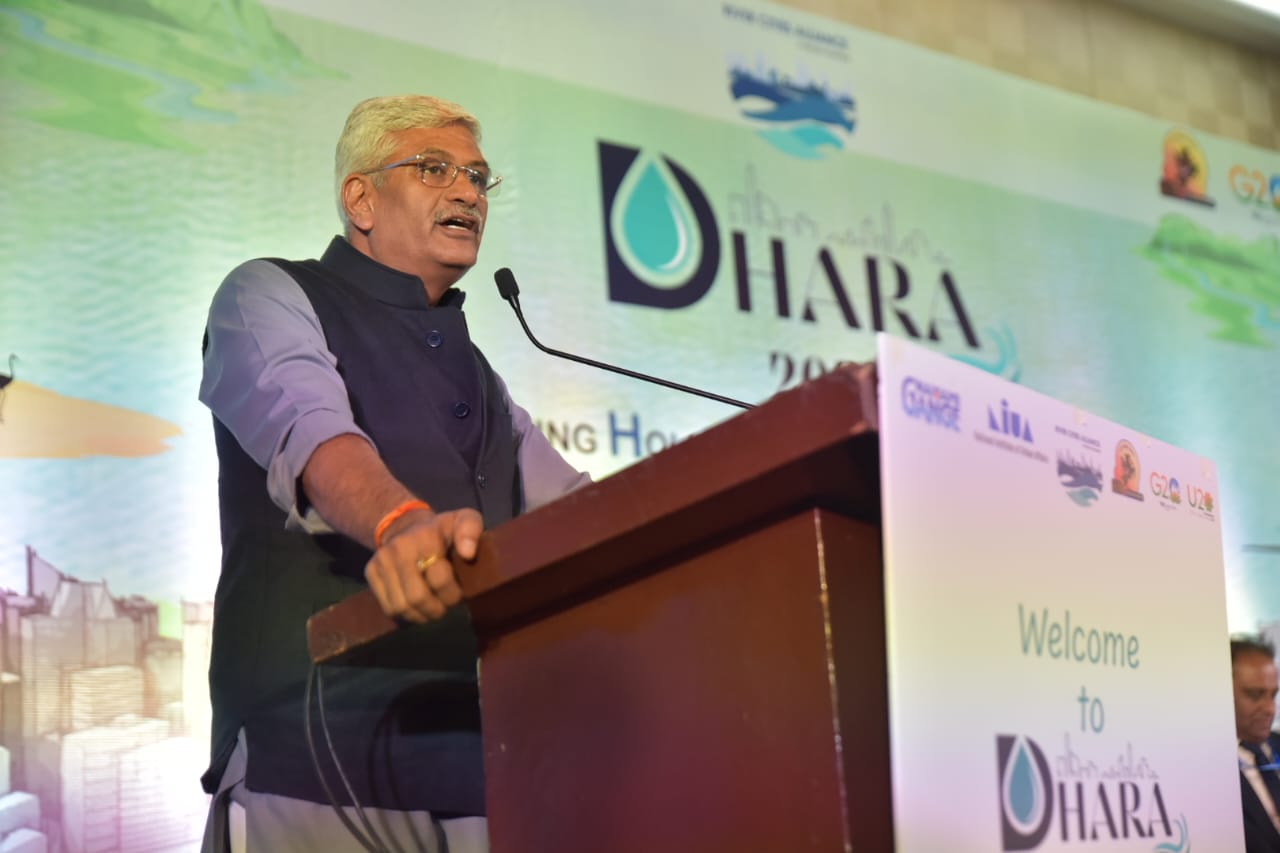
Hon'ble Minister of Jal Shakti Shri Gajendra Singh Shekhawat addressing the audience during the inaugural ceremony
PM Congratulates NIUA for Organising DHARA 2023
Water & Environment
The Hon'able PM Narendra Modi congratulated NIUA, National Mission for Clean Ganga (NMCG), and other stakeholders for the successful organisation of DHARA 2023 (Driving Holistic Action for Urban Rivers) and for serving as U20 technical secretariate. The event was the annual meeting of the River Cities Alliance (RCA) members, on 13-14 February 2023 in Pune, Maharashtra. Hon’ble Minister of Jal Shakti, Shri Gajendra Singh Shekhawat, presided over the opening session of the event.
The Urban River Management Plans (URMP) of Ayodhya and Aurangabad were also released by the Hon’ble Minister along with city representatives as well as the new alliance member cities inducted into RCA.
Twelve new cities were onboarded as part of the RCA, taking the tally to 107 cities. RCA had only 30 cities during its launch on 25 November 2021. Minister of State, Ministry of Housing and Urban Affairs (MoHUA) Shri Kaushal Kishore presided over the culminating session of the event.
Efforts by RCA and partners for DHARA 2023 was lauded by Prime Minister Narendra Modi through a message which was unveiled at DHARA. DHARA 2023 attracted around 300 people from river cities in India, including commissioners, additional commissioners, chief engineers, senior planners, academicians, water security experts, financial specialists, and others, to co-learn and discuss solutions for managing river stretches in their cities. Gwalior has been chosen as the location for the following RCA international meeting, DHARA 2024.
Inclusive Cities Centre (ICC)
Workshop on Good Governance to Create Policy Tools for PwDs
Building Accessible, Safe, and Inclusive Indian Cities (BASIIC)
NIUA and Varanasi Smart City Ltd. (VSCL) in collaboration with the United Nations Educational, Scientific and Cultural Organization (UNESCO) organised a Co-design Workshop for Good Governance for Urban Inclusion Through Data and Empowerment of Persons with Disabilities (GUIDE) with support from Kiran Society (Local Partner) on 31 January 2023.
The workshop was attended by 15 participants with diverse types of disabilities. The workshop aimed at promoting equal participation of Persons with Disabilities in policy making and governance. The participants contributed in the design and development of a household questionnaire for assessing the access to basic and essential urban services in Kashi. Various participatory activities and sessions were designed to draw meaningful insights, lived experiences, and everyday realities of persons with disabilities in Kashi.
The findings from this workshop and similar participatory exercises with user groups, government, academia, and civil society will be used in creating tools for policy makers to design inclusive urban policies, schemes, and interventions for ALL.
BASIIC & NOSPLAN Collaborate to Promote Gender Sensitive Mobility
Building Accessible, Safe, and Inclusive Indian Cities (BASIIC)
A collaborative effort between NIUA’s BASIIC project and NOSPLAN, a student organisation focused on planning, resulted in the organisation of two events: the Planning Trophy- Parivartan centered around the theme of Gender Sensitive Mobility, and AKS-Short Film which highlighted the importance of inclusive mobility. These events were held 16-17 February 2023, during the 24th Annual NOSPlan Convention - Civitas. The initiative aimed at encouraging students from various colleges and universities across the country to participate in identifying solutions for gender-sensitive mobility and document films based on inclusive mobility.
The overarching objectives of the engagement were as follows:
1. Map and document the best practices cities are undertaking to improve the mobility condition of women and other gender minorities in a case study format.
2. Identify ways through which the practices can be scaled up and replicated across different cities and situations.
3. Provide an easy road map for cities to replicate the best practices.
4. Create compelling videos highlighting the importance of inclusive mobility.
Inclusive Mobility Webinar Series Diagnoses Accessibility Problems of Public Spaces
Building Accessible, Safe, and Inclusive Indian Cities (BASIIC)
NIUA’s BASIIC programme collaborated with the Institute for Transportation and Development Policy (ITDP India) to host the second webinar in a series on Inclusive Mobility titled Nurturing Inclusive Design of Streets and Public Spaces on 31 January 2023. The workshop aimed to diagnose the underlying problems of accessibility issues in the design of streets and public spaces in India. It also showcased local best practices from various regions in India.
The key learnings from the webinar are:
- Need to improve the implementation capacities to translate the ideas into practice.
- It is crucial to achieving systemic, effective, and sustainable changes by ensuring the buy-ins from policymakers, ULBs, and engineers.
- A participatory and collaborative approach that is driven by behavioural change is necessary to promote inclusivity.
BASIIC Advocates Inclusive and Citizen-Centric Riverfront Development at DHARA 2023
Building Accessible, Safe, and Inclusive Indian Cities (BASIIC)
NIUA’s BASIIC programme conducted a session ‘Fostering Inclusive Riverfront Development’ at the DHARA 2023 event where inclusive and citizen-centric riverfront development practices from the local and global landscapes were showcased. The session included a panel discussion with distinguished practitioners in the field of achieving inclusive riverfront development.
Key highlights of the discussion were:
- Need for recognising rivers as a key element for the benefit of the marginalised groups dependent on the river.
- Treating Inclusion both as an outcome and process of development - Importance of stimulating behavioural change to conserve and protect rivers.
- During the session, an activity was conducted to gather participants’ perspectives on inclusive riverfront development.
- While Citizen Participation and Universal accessibility were voted the highest, catering to the needs of farmers and local residents, creating a self-financing model, and being mindful of downstream fishermen, were listed as other synonyms for Inclusion.
- Overall, the session highlighted the strong need to bring in synergies between environmental and social sustainability and developing Urban River Management Plans with the lens of Inclusion.
NIUA Trains Govt. Officials for ITC-Centric Urban Approaches
Infant, Toddler, Care-giver friendly Neighborhood (ITCN)
NIUA is implementing the Infant, Toddler and Caregiver-Friendly Neighbourhoods (ITCN) Capacity Building Programme with the support from Bernard van Leer Foundation. Five training delivery agencies working under the programme organised training of government officials working in different parts of the country in February 2023. The training focussed on creating an ITC-centric city-level dashboard, designing public spaces, and streets for infants, toddlers and caregivers, and proximity of care approaches. The five training agencies involved in the training were: All India Institute of Local Self Government, Mumbai; Centre for Good Governance, Dr. R. S. Tolia Uttarakhand Academy of Administration, Nainital; Engineering Staff College of India, Hyderabad; Kerala Institute of Local Administration, Thrissur; and Regional Centre for Urban and Environmental Studies, Lucknow.
NIUA Hosts Environment Weekly Challenge in a Build-Up to the NYC 2023
Youth Future
NIUA hosted a five-week challenge in alignment with PM's Mission LiFE (Lifestyle for Environment). The aim was to embrace an environmentally conscious lifestyle that emphasises mindful and deliberate utilisation rather than mindless and destructive consumption. This challenge was a pre-cursor to NIUA's National Youth Conclave on March 13-14, 2023 with support from MoHUA and the Ministry of Youth Affairs and Sports, under the aegis of India’s ongoing G20 presidency.
The weekly challenge commenced on 10 February 2023 and was shared every week on NIUA social media platforms.
Climate Centre for Cities (C-Cube)
CLAP Now Game Introduced During LCCM Workshop
Climate Centre for Cities (C-Cube)
Climate Action Planning (CLAP) Now, an interactive card game for city officials developed by NIUA’s C-Cube was introduced to the participants at the Leaders in Climate Change Management (LCCM), at a workshop in Mysuru on 5 February 2023. CLAP NOW works as a tool to enable stakeholder consultation in cities for the development of Climate Action Plans, engaging the city officials from various departments and other stakeholders, who interact, collaborate and together develop a holistic Climate Action Plan.
The LCCM participants were also introduced to the ClimateSmart Cities Assessment Framework (CSCAF) along with the CLAP Now game through a role-play approach. The participants were distributed in three teams (comprising of commissioners, engineers, planners, etc) and were provided with a city profile each for them to realise the challenges and identify relevant actions considering the various aspects such as budget, implementation time, and impact. The session helped the participants in understanding how to mainstream actions within ongoing urban development, prioritise actions to achieve the intended short, medium- and long-term impacts, and understand the concept of co-benefits and how to achieve them.
'Make a SWITCH!' Challenge, a Pre-Event Activity of NYC Launched
Climate Centre for Cities (C-Cube)
As a pre-event activity of the National Youth Conclave 2023, the NIUA’s C-Cube organised the ‘Make a SWITCH’ Challenge for the youth to connect, collaborate, and co-create sustainable wellness climate actions together on 8 February 2023. The Challenge aimed to invite and engage youth to bring insights into traditional climate knowledge and amplify community participation.
Participants in teams of two-to-eight members were invited to submit a two-to-three minutes video of their climate actions and ideas. An open audience webinar was conducted on 24 February 2023 to create awareness about the Challenge. The Climate Practitioners India Network (CPIN) members were also introduced to the Challenge through a webinar meeting on 25 February 2023.
NIUA Director Emphasises People-Centric Master Plans at WSDS
Climate Centre for Cities (C-Cube)
Under the Transformative Climate Action using Participatory Data-driven Decision-making Platforms (T-CAP) project, TERI organised a panel discussion session on Towards People-Centric Smart City Development during World Sustainable Development Summit (WSDS) on 23 February 2023.
The panel discussed various aspects of people-centric urban development and the relevance of an inclusive approach to bring together all stakeholders, especially vulnerable groups. NIUA participated in the session. Hitesh Vaidya, Director – NIUA emphasised the need for preparing the master plan of a smart city in a people-centric manner.
Student Thesis Competition Season 3: 'WriteShop' Organised
Water & Environment
NIUA in association with the National Mission for Clean Ganga (NMCG) hosted a thesis competition on Re-imagining Urban rivers to achieve the sensitisation and capacity-building of students for river-sensitive planning and development.
In the third season of the competition, 20 students from across India are being supported through mentorship and financial assistance. A write shop was organised for these students from 15-16 February 2023 at the Yashwantrao Chavan Academy of Development Administration (YASHADA) in Pune where they discussed their work with mentors from NIUA and fellow students. Through interactive activities, the students were encouraged to use their creativity and imaginative skills to strengthen their thesis projects on urban river management.
NIUA Highlights Significance of Operationalising NBS at DHARA 2023
City Climate Alliance
NIUA’s City Climate Alliance and India Forum for Nature-Based Solutions hosted the Operationalising Nature-based Solutions in River Cities session at DHARA 2023. It focused on the potential for nature-based solutions to address the unique experiences, risks, and challenges of implementing NBS in river cities.
The session included case studies and good practices from the perspective of finance, implementation, service providers, and policy-creating organisations.
#IndiaClimateDialogue - a Webinar Episode Organised
City Climate Alliance
Several cities in India are in the process of actively putting together Climate Action Plans (CAPs) to meet emission targets and adapt to climate change. CAPs enable cities to determine evidence-based targets and chart out green pathways for the way ahead.
#IndiaClimateDialogue, a webinar episode 'Climate Action Plans: Looking Back and Ahead' was organised by NIUA’s C-Cube. It was aimed at helping cities answer some crucial challenges, learn from the past, and plan ahead toward a more holistic approach to CAPs.
First City Biodiversity Index of Surat Launched
City Investments to Innovate, Integrate and Sustain (CITIIS)
Sustainable cities need to conserve biodiversity and protect their ecosystems to combat desertification and mitigate the effects of climate change. To aid Surat in this endeavor, the first City Biodiversity Index for Surat has been developed under the CITIIS program, in collaboration with Surat Smart City.
The report on the index was launched on 8 February 2023 by Municipal Commissioner of Surat Shalini Agarwal, IAS, CEO of Surat Smart City Development Limited, Swati Desai, Deputy Director of AFD in India, Camille Severac, and Program Director of CITIIS Naim Keruwala. The report presents a baseline scenario that will help the local government and other practitioners identify areas for improvement, fine-tune their biodiversity and ecosystem protection programs, and monitor such programs, thus ensuring long-term sustainability that is in accordance with the National Action Plan on Climate Change (NAPCC).
Fourth Urban Waterbody Rejuvenation Workshop Held in Odisha
City Investments to Innovate, Integrate and Sustain (CITIIS)
Odisha has developed a participatory, community-led waterbody rejuvenation model through blue-green infrastructure interventions. To support this endeavor, NIUA and the Housing & Urban Development Department (H&UDD) of Odisha organised a series of training workshops under the #CITIIS program to build the capacity of municipal officials.
The fourth Cluster Training on Urban Waterbody Rejuvenation was conducted on 21 February 2023 in Koraput. Over 200 municipal and district administration officials, elected representatives, and TULIP interns from 18 Urban Local Bodies in Odisha participated in it. They took back key lessons in mapping and assessing urban wetlands and developing community-led restoration strategies. Sagarika Patnaik, Special Secretary, H&UDD and State Mission Director, AMRUT emphasised the need for protecting urban waterbodies, preserving their natural water spread area, and maintaining the purity of the water.
Green Mobility Corridor Plog Run Organised in Hubballi
City Investments to Innovate, Integrate and Sustain (CITIIS)
The CITIIS program is developing an eco-friendly corridor for non-motorised transport and open spaces along the Unkal Nala. The project is also constructing retaining walls and facilitating improved sewage disposal along the Nala. To raise awareness about the importance of the project and educate residents about keeping the Unkal Nala clean, a Green Mobility Corridor Plog Run was held on 25 February 2023.
Plogging is an outdoor activity that combines jogging and picking up litter. Students and members of RWAs living near the Nala participated in the run. MLA Shri Arvind Bellad and Corporators Shri Rajanna Koravi and Shri Umeshagouda Koujageri were also present. The run took the participants through the Green Mobility Corridor developed under CITIIS, ending at Tolankere Lake. The teams that collected the most waste by weight won prizes. The run was followed by a demonstration on home composting by the organisation Hasiru Dala and a skit on the theme by students of Karnataka University. Stalls selling eco-friendly products and waste recyclers added to the event.
Invited Speakers Shared CWIS Experiences at DHARA 2023
Sanitation Capacity Building Platform (SCBP)
SCBP at NIUA curated a breakout session on City Wide Inclusive Sanitation (CWIS) during DHARA 2023, which became a platform for India’s river cities to network and initiate a dialogue about urban river management and best practices pan India. The session focussed on adherence to inclusivity as a tangible and intangible aspect that should be embedded in the sanitation value chain. The speakers for the session Bhitush Luthra, Manu Tyagi, Donata Mary Rodrigues, and Sabita Madhavi Singh gave exposure to the concept of CWIS along with:
- Monitoring tools
- Odisha’s State Sanitation journey
- Learnings from Trichy city
- The deep-rooted connection of rivers’ health with sanitation
SCBP also showcased the innovative Sanitation Board Game during the event, narrating the journey of its Capacity Building programs from two-dimensional presentations to innovative methods that make the training more valuable and interesting.
Trainings to endorse Capacity Building on Integrated Wastewater & Septage Management’
Sanitation Capacity Building Platform (SCBP)
SCBP at NIUA in collaboration with The Regional Centre for Urban & Environmental Studies (RCUES), Lucknow organised four advanced training programmes on Integrated Wastewater and Septage Management (IWSM) for three days. This was aimed to build the capacities of Urban Local Bodies and state officials on planning, designing, implementation, and management of used water treatment solutions.
One training was held at Jabalpur, Madhya Pradesh; two trainings at Raipur, Chhattisgarh; and the fourth one at Gwalior, Madhya Pradesh with the support of Ecosan Services Foundation (ESF). The training provided a holistic understanding of designing used water and septage management solutions, to address the priorities under national missions i.e. SBM 2.0 and AMRUT 2.0.
Centre for Digital Governance (CDG)
Building Plan Approval Expert Group Formed for Preparing Knowledge Standards for Digital Urban Governance
National Urban Digital Mission (NUDM)
The Seventh panel of eminent experts for the preparation of Building Plan Approval Knowledge Standards- Guidelines and Specifications has been onboarded on 3 February 2023 for digital urban governance. The group of diverse stakeholders and experts will collaborate in preparing taxonomies and processes for Building Plan Approval which will enable data usage, data-driven governance, and interoperability (foundational, structural, and semantic) of data and processes in Urban Local Bodies, in a secure manner.
NUDM Discusses Financial Mechanism for Smart Cities Tech at India-EU Urban Forum
National Urban Digital Mission (NUDM)
NUDM Chief Programme Officer, Manpreet Singh, attended the third India-EU Urban Forum in New Delhi on 13 February 2023. It was organised by MoHUA and EU India to facilitate the advancement of cooperation between India and Bhutan and shape the future agenda for the two nations.
The CPO NUDM talked about the elements an implementation approach should include and how financing mechanisms can target effective delivery and the embedding of the Smart City Tech within the urban systems.
Digital and Safe Cities Discussed at Digital Transformation Conclave
National Urban Digital Mission (NUDM)
NUDM participated in the fourth panel discussion of Digital Transformation Conclave on 10 February 2023 at Chandigarh. NUDM Chief Programme Officer, Manpreet Singh moderated the panel discussion on the topic ‘Digital & Safe Cities/Districts in the Digital Era’. The panellists discussed the safe city concept, public-safety information of different types, multi-agency collaboration, etc.
Latest Tech Advancement Discussed at Digital Senate Summit 2023
National Urban Digital Mission (NUDM)
NUDM represented at the third edition of the Digital Senate Summit on the theme of Reimaging Digital Public Goods in 2023, organised by the Tech Observer Magazine in New Delhi on 17 February 2023.
NUDM Regional Lead, Pankaj Sharma participated in the event and shared his views on the latest advancements in digital technology that can enhance the governance experience.
NULP Launches E-Nagarpalika Property Tax Guide for Madhya Pradesh
National Urban Learning Programme (NULP)
National Urban Learning Platform (NULP) has launched an interactive course on E-NagarPalika Property Tax Guide for municipal officials in Madhya Pradesh. The course is designed to address their learning needs and provide a comprehensive guide to various property tax services available on E-Nagar Palika.
The interactive nature of the course makes it an engaging and effective learning tool that will allow municipal officials to gain a better understanding of the E-Nagar Palika.
With the launch of this course, municipal officials will be equipped with the necessary knowledge and skills to effectively manage property tax collection and address any related issues that may arise. This is an important step towards ensuring that municipal officials in Madhya Pradesh are able to carry out their duties with competence and efficiency.
Centre for Urbanisation and Economic Growth (CUEG)
SHLC Research Findings on Urban Inequalities Presented at ARC Workshop, University Of Glasgow
Sustainable, Healthy and Learning Cities and Neighbourhood (SHLC)
At the SHLC workshop - Urban Neighbourhood Sustainability and Impacts from Covid-19, held on 15-16 February 2023 at Advanced Research Centre (ARC), University of Glasgow, Debolina Kundu of NIUA chaired a session titled: Understanding Inequality through the Spatial Lens: A Case of Delhi and Madurai. The presentation highlighted the existing inequalities in access to various physical and social infrastructures across neighbourhoods of different socio-economic strata.
The analysis emphasised that inequalities are more pronounced in Delhi as compared to Madurai. The presentation also discussed the vulnerabilities of lower-income and poor neighbourhoods during the outbreak of COVID-19.
Additionally, SHLC’s India team lead also chaired a session titled: Urban and Neighbourhood Inequalities and Challenges for future research in Africa.
Report on 'The Urban Century: Trends and Patterns of Urbanisation in Asia and Africa' released
Sustainable, Healthy and Learning Cities and Neighbourhood (SHLC)
NIUA’s SHLC team released a report The Urban Century: Trends and Patterns of Urbanisation in Asia and Africa during the workshop on Urban Neighbourhood Sustainability and Impacts from Covid-19 held on 15-16 February 2023 at Advanced Research Centre (ARC), University of Glasgow.
The report is a result of the SHLC team’s research conducted as part of the project 'Sustainable, Healthy, Learning Cities and Neighbourhoods' funded by the Global Challenges Research Fund (GCRF). The report discusses the urbanisation discourse in Asia and Africa, highlighting the regional complexities and the policy issues related to the process of urbanisation in the countries of the two continents.
BBSR-Analysen KOMPAKT Series’ Report on Affordable & Clean Energy Released
Spatial Structures and Trends: Europe and India
A report India, Germany and Europe: A Spatial Perspective at SDG 7 on Affordable and Clean Energy was released under the BBSR-Analysen KOMPAKT series. The series is a joint venture of the Federal Institute for Research on Building, Urban Affairs and Spatial Development (BBSR) and NIUA and the report is a result of the fourth year of the collaboration.
The report provides a national and supranational spatial perspective on the importance of affordable and clean energy for balanced urban and rural societies. It illustrates spatial structures by selected indicators of SDG 7 on Affordable and Clean Energy, amongst others: renewable energy access and share, energy intensity, and installed renewable energy.
Measuring Sustainable Development across Levels in India
Spatial Structures and Trends: Europe and India
During the sixth Dortmund Conference on Spatial and Planning Research, held during 13-15 February 2023 in Dortmund, Debolina Kundu presented a paper - Measuring Sustainable Development across Levels in India.
The paper is the outcome of the research under the project - Spatial Structures and Trends: Europe and India and examine the frameworks and initiatives for measuring the progress towards the Agenda 2030 at various levels (national, state, and local). The paper also explores the advances and challenges in the existing statistical ecosystem at various levels and associated institutional structures.
Recent Publications






